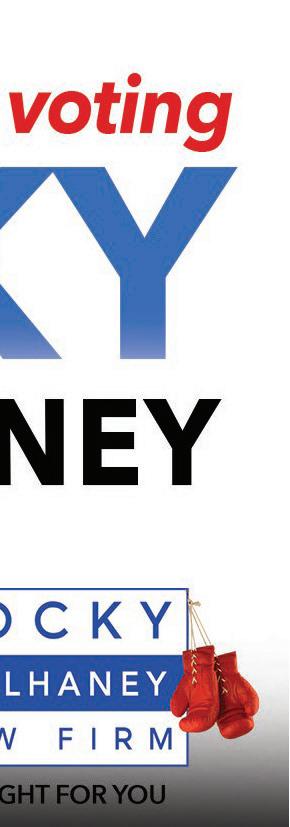CITY LIMITS: FAMILIES OF THIRD-GRADERS CONTEND WITH “CHAOS”
PAGE 7
MUSIC: TALKING TO ALICIA BOGNANNO ABOUT BULLY’S LUCKY FOR YOU
PAGE 33

CITY LIMITS: FAMILIES OF THIRD-GRADERS CONTEND WITH “CHAOS”
PAGE 7
MUSIC: TALKING TO ALICIA BOGNANNO ABOUT BULLY’S LUCKY FOR YOU
PAGE 33
EXAMINING THE PAST, PRESENT AND FUTURE OF TENNESSEE’S RIGHT-WING EXTREMISM PROBLEM







ART
THIS WEEK ON THE WEB:
Third Degree
As the school year ends, families of thirdgraders contend with ‘chaos’
BY KELSEY BEYELERSpace: June 2023
The First Saturday of Gemini season shines with strong solo shows and great group displays
BY JOE NOLANBOOKS
Ron Obasi Takes Stock in ‘101ThaBeat’
BY KATHERINE OUNGPerforming Womanhood
Why Tammy Wynette Matters places the singer’s work in a feminist context
BY JACQUELINE ZEISLOFT;CHAPTER16.ORG
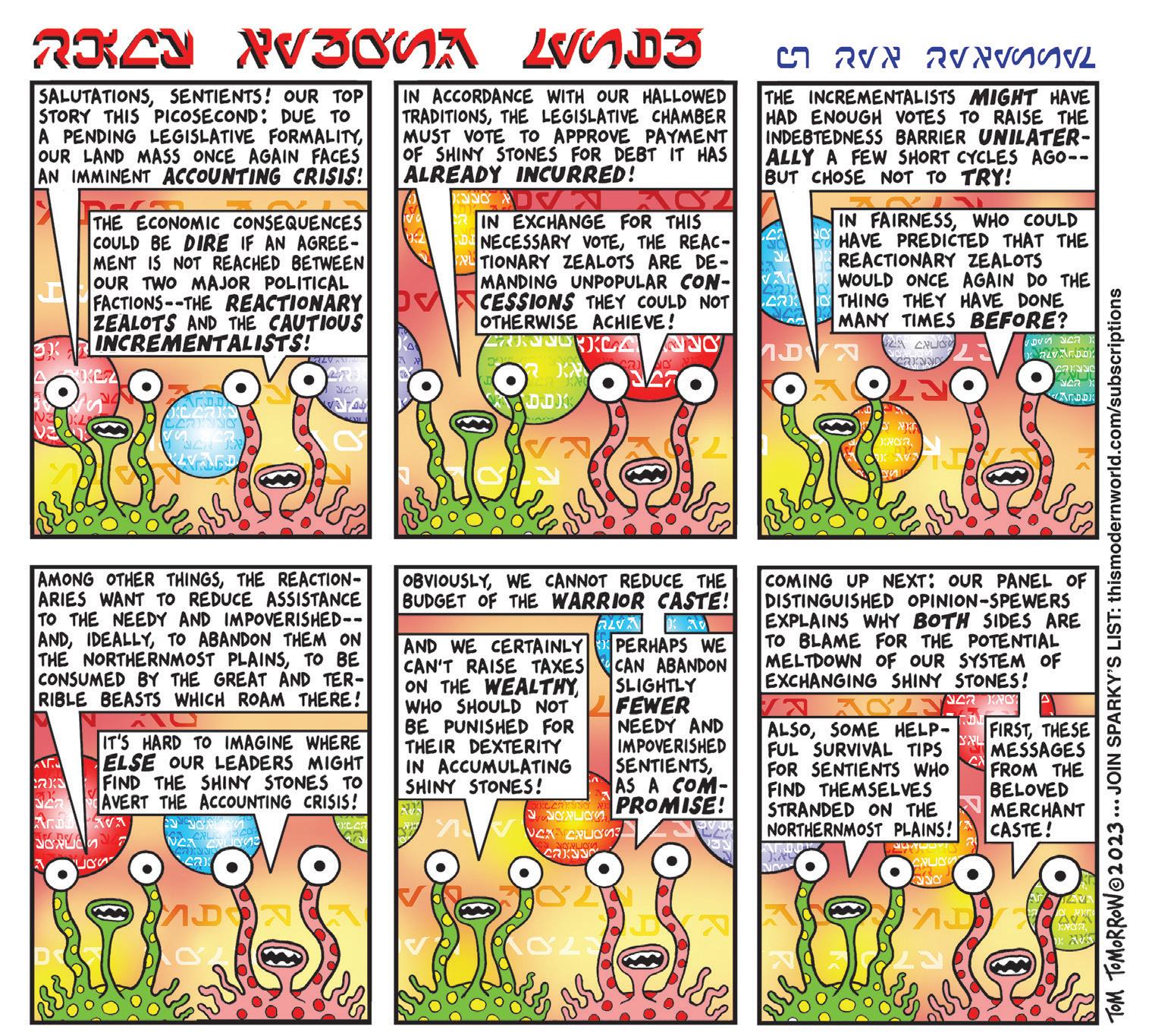
VODKA
To Have and to Hold and to Dust
COVER
Mayor’s Office Moves on NASCAR Deal
Margot Cafe & Bar Slates Birthday Week
What one small appliance taught me about selfacceptance
BY MARY LIZA HARTONGWhere to See the Mayoral Candidates
BY BETSY PHILLIPS BY ELI MOTYCKAKing Gizzard and the Lizard Wizard, Durango Fest, Bea Troxel, Shania Twain and more
FOOD AND DRINK

He is the most lovable canine with a heart of gold and the most adorable ears! This 9-month-old charmer is on a heartfelt quest to find his forever home.?
With his friendly and outgoing nature, he’s a social butterfly among his furry pals who dreams of finding a forever home that already has a resident pup. He truly thrives on companionship and would be over the moon to have a doggy sidekick to share daily adventures with.? Rosco is a happy-go-lucky guy who’s always up for playtime and cuddles - Please visit Today at NHA!

Call 615.352.1010 or visit nashvillehumane.org
Located at 213 Oceola Ave., Nashville, TN 37209

Adopt. Bark. Meow. Microchip. Neuter. Spay.
Editor-in-Chief D. Patrick Rodgers
Managing Editor Alejandro Ramirez
Senior Editor Dana Kopp Franklin
Arts Editor Laura Hutson Hunter
Music and Listings Editor Stephen Trageser
Digital Editor Kim Baldwin
Associate Editor Cole Villena
Contributing Editors Erica Ciccarone, Jack Silverman
Staff Writers Kelsey Beyeler, Stephen Elliott, Hannah Herner, Eli Motycka, William Williams
As we approach the midpoint of the year, it’s nice to reflect on the years that lie behind us. One particularly significant accomplishment is the control we have gained over the COVID-19 pandemic — control that brings long-awaited relief. There was a time when the future of our tourism industry seemed uncertain. We weren’t sure if our state’s tourism sector would be permanently negatively affected. But if last year’s numbers are any indication, we are back on track.
In 2022, Tennessee experienced an unprecedented surge in visitor spending, firmly establishing the state as a premier travel destination. We were already popular with American tourists and even world travelers, but as WKRN recently reported, last year saw a $3 billion increase in visitor spending. That means Tennessee’s tourism industry reached a record-making $27.5 billion, an outstanding growth rate of nearly 14 percent from the previous year.
Tennessee’s travel spending shot the state from its previous rank of 14th in the nation up to 11th place. These preliminary rankings, released in April by the U.S. Travel Association, not only demonstrate the state’s rapid ascent, but also solidify Tennessee as one of the fastest-growing states in terms of travel expenditure. Texas, for instance, saw only a 2 percent increase from 2019 to 2022, and Florida saw 9 percent.
The tourism industry’s extraordinary growth in Tennessee also significantly contributes to the state’s economic prosperity. Last year, the industry’s prosperity was exemplified by its contribution of $1.8 billion in actual sales tax collections, according to the Tennessee Department of Tourism. This revenue represents a tangible benefit to the state, enabling the government to invest in infrastructure, education, health, safety and other public services that benefit residents and visitors alike.
To celebrate this milestone, state leaders gathered two weeks ago at one of Tennessee’s most revered tourist attractions, the Great Smoky Mountains National Park. While there, Tennessee Department of Tourist Development Commissioner Mark Ezell expressed his gratitude toward the hardworking individuals within the tourism, leisure and hospitality industry. Their relentless efforts and dedication played a pivotal role in propelling Tennessee to these new milestones.
The success of Tennessee’s tourism industry translates into a multitude of employment opportunities. Currently, 352,000 individuals are employed in the state’s leisure and hospitality sector. With the summer travel season approaching, these numbers are poised to grow even further, offering job seekers and aspiring professionals a chance to be part of a thriving industry. The exponential rise in visitor spending not only benefits the state’s economy but also positively impacts various supporting sectors, including accommodations, transportation, dining and entertainment.
Oak Steakhouse’s Nashville-area director Gabriel Raven also attended the event, and was quoted as saying, “2022 has been our highest-grossing year to date since opening in 2017.” Raven said her employer “gained 8,000 more diners than previous years — a 14 percent increase.” That is just one business owner, but many others no doubt experienced similar results.
The achievements of 2022 set the stage for a promising future for Tennessee’s tourism industry. According to WKRN, county-by-county numbers will be released this fall and will no doubt provide further insight into the geographical distribution of visitor spending. Tennessee’s 2022 travelspending numbers are what I call a shining testament to our state’s irresistible appeal and the unshakable spirit of our tourism industry. The increase in visitor spending keeps us firmly established among the nation’s elite travel destinations. We have so much to offer those who visit, from our beautiful landscapes to trend-setting food establishments, museums and, of course, our music and entertainment scenes. I take great pride in the triumphs and achievements of our state. Short of another pandemic, we will continue to experience growth and increased livelihood, which will undoubtedly solidify our city and state’s prominent position in the rankings. Still, we all have a role to play in this success by embracing our hospitable nature and warmly welcoming visitors to our city. Together we can contribute to the ongoing prosperity and reputation of both our beloved city and state.
Bill Freeman is the owner of FW Publishing, the publishing company that produces the Nashville Scene, Nfocus, the Nashville Post, and The News.
Contributing Writers Sadaf Ahsan, Radley Balko, Ashley Brantley, Maria Browning, Steve Cavendish, Chris Chamberlain, Lance Conzett, Connor Daryani, Steve Erickson, Nancy Floyd, Randy Fox, Adam Gold, Kashif Andrew Graham, Seth Graves, Kim Green, Steven Hale, Steve Haruch, Edd Hurt, Jennifer Justus, Christine Kreyling, J.R. Lind, Craig D. Lindsey, Margaret Littman, Brittney McKenna, Marissa R. Moss, Noel Murray, Joe Nolan, Betsy Phillips, John Pitcher, Margaret Renkl, Daryl Sanders, Megan Seling, Jason Shawhan, Michael Sicinski, Nadine Smith, Ashley Spurgeon, Amy Stumpfl, Kay West, Abby White, Andrea Williams, Ron Wynn, Charlie Zaillian
Art Director Elizabeth Jones

Photographers Angelina Castillo, Eric England, Matt Masters
Graphic Designers Sandi Harrison, Mary Louise Meadors, Tracey Starck
Production Coordinator Christie Passarello
Graphic Design Intern Abbey Parchman
Festival Director Olivia Britton
Marketing and Promotions Manager Robin Fomusa
Publisher Mike Smith
Director of Digital Advertising | Key Account Manager Michael Jezewski
Senior Advertising Solutions Managers Carla Mathis, Heather Cantrell Mullins, Jennifer Trsinar, Keith Wright
Advertising Solutions Managers Teresa Birdsong, Niki Tyree, Alissa Wetzel
Sales Operations Manager Chelon Hill Hasty
Advertising Solutions Associates

Audry Houle, Jack Stejskal
Special Projects Coordinator Susan Torregrossa
President Mike Smith
Chief Financial Officer Todd Patton
Corporate Creative Director Elizabeth Jones
IT Director John Schaeffer
Circulation and Distribution Director Gary Minnis
For advertising information please contact: Mike Smith, msmith@nashvillescene.com or 615-844-9238
FW PUBLISHING LLC

Owner Bill Freeman
VOICE MEDIA GROUP
National Advertising 1-888-278-9866 vmgadvertising.com
©2023, Nashville Scene 210 12th Ave. S., Ste. 100, Nashville, TN 37203. Phone: 615-244-7989.
The Nashville Scene is published weekly by FW Publishing LLC. The publication is free, one per reader. Removal of more than one paper from any distribution point constitutes theft, and violators are subject to prosecution. Back issues are available at our office. Email: All email addresses consist of the employee’s first initial and last name (no space between) followed by @nashvillescene.com; to reach contributing writers, email editor@nashvillescene.com.
Editorial Policy: The Nashville Scene covers news, art and entertainment. In our pages appear divergent views from across the community. Those views do not necessarily represent those of the publishers. Subscriptions:

Subscriptions are available at $150 per year for 52 issues. Subscriptions will be posted every Thursday and delivered by third-class mail in usually five to seven days. Please note: Due to the nature of third-class mail and postal regulations, any issue(s) could be delayed by as much as two or three weeks. There will be no refunds issued. Please allow four to six weeks for processing new subscriptions and address changes. Send your check or Visa/MC/AmEx number with expiration date to the above address.
In memory of Jim Ridley, editor 2009-2016















Nashville’s third-graders have experienced significant challenges during their short lives. As kindergarteners, their education was disrupted by COVID-19. They’ve since experienced a deadly shooting at a private school in their community, and many are now facing the possibility of being held back.
The retention risk stems from a 2021 state law seeking to boost literacy by focusing on a grade seen by experts and educators as significant in determining a child’s future academic success. Per the law, public school third-graders who don’t score high enough on the English language arts portion of the Tennessee Comprehensive Assessment Program standardized test must receive specified academic interventions in order to be promoted to the fourth grade.
Those who score in the “approaching” category of the TCAP must attend summer school or receive tutoring in the fourth grade in order to advance. Those who score “below” must fulfill both requirements. Students who opt into summer school must maintain a 90 percent attendance rate. Those who score “approaching” and attend summer school must demonstrate “adequate growth” for it to count — although the state didn’t clarify what that meant until May 19, when the Tennessee Board of Education defined it as showing at least 5 percent improvement on a post-test assessment. Some students, including those with disabilities or suspected disabilities, those who have been previously retained, and those who are new English learners, are exempt from the law. Eligible students can appeal a retention decision with the Tennessee Department of Education.
“I think the best word to use for it is ‘chaos’ and just overall confusion,” says Sara Morrison, a Metro Nashville Public Schools thirdgrade teacher. “The timeliness of all of it has seemed extremely unrealistic. And now, I feel
 BY KATHERINE OUNG
BY KATHERINE OUNG
Everyone I talk to about Thomas Solinsky has a different nickname for him. He’s “Nashville’s Johnny Appleseed” to some, and “The Ultimate Connector” to others. Or as country singer and “friend of Thomas” Dierks Bentley puts it, he’s “The Tree Ninja.”
Solinsky estimates that over the past 15 years he’s planted more than 40,000 trees across Tennessee and its surrounding states. He has put them in forests, by waterways, even at elephant and pig sanctuaries, but is most proud of the “urban forest” he’s cultivated across Nashville — by sidewalks, on median strips and in front of businesses and residen-
like all of that is coming to fruition as far as no one really knows what’s going on. There are still all these questions. Parents are furious.”
MNPS students received their initial TCAP scores on May 22. Those who didn’t score high enough retested in the following days, attempting to land a better score. The initial results showed that 29.7 percent of MNPS students scored high enough to be promoted without academic interventions. The breakdown of each TCAP category (before retesting) shows that 11.1 percent of these students exceeded expectations, 18.6 percent met them, 34.4 percent scored in the approaching category and 37.9 percent fell below expectations. Those who retested received their new scores on Friday. (The Scene was not able to obtain the official numbers before sending this article to press.) Statewide, roughly 60 percent of third-graders faced possible retention based on their scores.
Both the TDOE and MNPS tout academic gains, but the numbers still indicate that the majority of Nashville’s students and Tennessee’s students are not proficient in reading — at least as far as the test defines proficiency. Critics argue that the TCAP is more complex than necessary and that it isn’t a fair way to assess students’ reading abilities.
“I had a parent on the phone with me at 7:45 last night panicking about her daughter being held back,” says Morrison. This student, like many others, has demonstrated reading proficiency in other areas. Morrison says she’s in the gifted student program, scored highly on benchmark testing and memorized an entire school play. “She is at risk for retention,” says Morrison, “and it’s just wild to me.”
The law has rippling effects. Summer plans have been in limbo as parents determine whether their students need to take summer classes. For some parents, these plans might include out-of-state custody arrangements or lost summer camp deposits. (YMCA Camp Widjiwagan will refund depos-
tial homes.
“He puts these trees in without people even knowing, and years later, they look around the neighborhood and think, ‘Gosh, this is all one person’s doing,’” says Bentley, who met Solinsky after stumbling upon him planting a tree while he was on a walk.
In cities like Nashville where new construction is ever-multiplying, trees counteract the urban heat island phenomenon — the temperature-raising effect of natural greenery being replaced by warmth-trapping buildings and asphalt roads. Trees aid in stormwater management and absorb emitted greenhouse gases from the atmosphere. Studies also indicate that urban trees improve the mental health of surrounding residents.
“I don’t like to talk about the numbers of trees planted, really, but the impact,” says Solinsky. “Where trees have been cut down in cities, they cannot naturally drop their seeds and regenerate. A single tree has so much benefit when planted in an urban area.”
Solinsky conceived his project, known formally as
its for students affected by this law.) School staff must prepare for a summer program catering to thousands of students. Some educators are unsure how this could affect school capacity and staffing in the coming school years if large numbers of third-graders are retained.
Melodie Madden Adams’ son was affected by the law. She says he had trouble sleeping and was “terrified of not getting to be with his friends next year. … The stress was awful.”
Her son passed the test, “but I don’t think it would have happened without all the interventions that we did on our own, like the tutoring and all of the extra hours that he should have been playing outside,” says Madden Adams. She also emphasizes how well teachers handled helping parents and students navigate the process.
Many hoped state lawmakers would repeal the third-grade retention law during this year’s legislative session — they didn’t. After much consideration and public pushback, state leaders added another benchmark test to be considered in retention decisions, but that provision won’t kick in until next school year. On May 24, as reported by Tennessee Lookout, a joint fiscal review committee extended the state’s contract with British company NCS Pearson, the testing vendor that administers the TCAP tests. They’re also giving the vendor an additional $39 million, increasing the contract to $132 million.
“Seeing lawmakers and people who maybe have not been in the classroom since they were a student in college or high school, let alone ever taught a class, make these decisions for these kids — it seems very unfair,” says Morrison. “‘Defeating’ is a really good word to describe it.”
EMAIL EDITOR@NASHVILLESCENE.COM
Nashville’s Community Oversight Board is preparing for an uncertain future with a new chair — nonprofit exec Alisha Haddock — and counsel from prominent Nashville attorney Tricia Herzfeld. As written, a new state law would severely hamstring the citizen-led police accountability body formed by referendum after Nashville police killed Jocques Clemmons and Daniel Hambrick in two separate shootings in 2017 and 2018. …
The mayor’s plan to woo NASCAR to Nashville might be stalling in a legal and political thicket. Cooper proposes big renovations to The Fairgrounds Nashville, which he will then hand over to regional racing operator Speedway Motorsports — a plan that parties hope to get inked before this Metro Council term ends. At the same time, the city is bringing a legal fight over new state legislation — straight from lobbyists’ notebooks — that drops the threshold needed to pass the new NASCAR deal. A lower bar would benefit proponents of the deal, including the mayor’s office, but flies in the face of the city’s charter, a semisacred document policed by Metro Legal’s Wally Dietz Mayoral candidates face a full schedule of forums across the county, including 14 in June, sponsored by various civic, nonprofit and media organizations. Diehard campaigners can look forward to two-adays on June 12 and June 29. Tourism, growth, transportation and education have emerged as headline issues for the race’s 12 candidates. Keep your eyes on Pith for recaps of as many of these forums as we can handle. … The Metro Planning Commission deferred a zoning change that would make way for the Ariza, a residential development in Bellevue. Jim Rossi, a professor at Vanderbilt Law School, has led efforts to block the rezone, which is slated for an undeveloped bend in the Harpeth River near I-40 and Highway 70. The Ariza battle follows a high-profile fight over the future of Belle Meade Plaza
NASHVILLESCENE.COM/PITHINTHEWIND

EMAIL: PITH@NASHVILLESCENE.COM
TWEET: @PITHINTHEWIND
STATEWIDE, ROUGHLY 60 PERCENT OF THIRD-GRADERS FACED POSSIBLE RETENTION BASED ON THEIR SCORES.
SoundForest, in 2008 — a time when he says next to no one in Nashville was actively planting in urban areas. Although he began his work in collaboration with local and state governments, Solinsky laments the “bureaucracy” of tree planting through official channels.
Individuals seeking to plant in Nashville’s public right-of-way must request approval from Metro Nashville, and Solinsky recalls running into a “huge backlog.”
“I had a huge area that I wanted to cover, and I wasn’t getting any response,” he says. “The wait time to get people [from Metro] to come out was so long. I was like, ‘I’m done. I need to go on my own and get these trees planted.’”
Solinsky says he hasn’t received negative feedback from the city since beginning to plant on his own terms around 2015, but he emphasizes that he closely follows the city’s street tree safety regulations.
Solinsky relies on donations and the volunteer manpower of family, friends and neighbors — from staff at local businesses to students at University School of Nashville. Frothy Monkey owner Ryan Pruitt recalls how Solinsky suggested that trees should be planted by the coffee shop’s front porch and pitched a SoundForest fundraiser at the coffee shop.
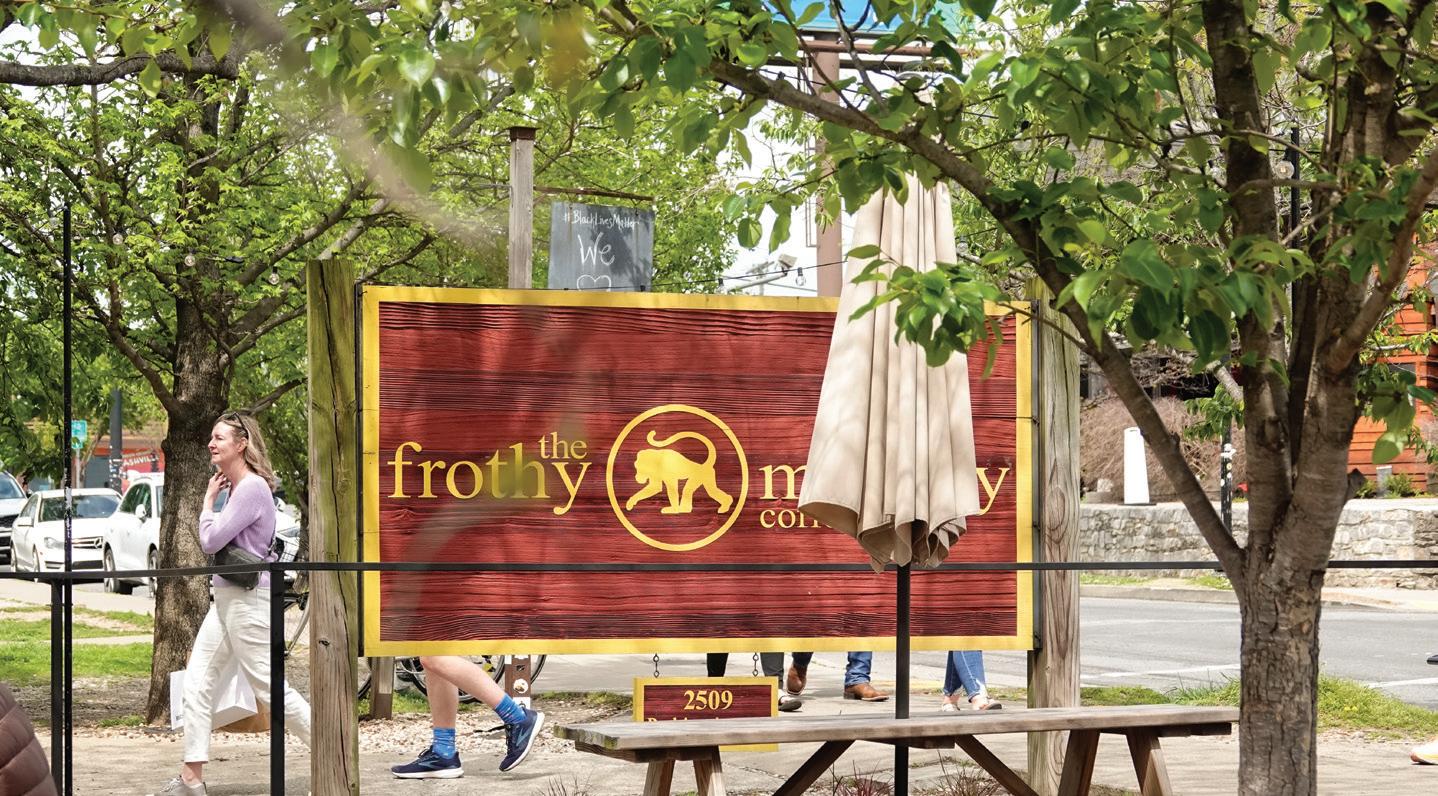
“It’s rare that Tom will have a crazy idea and then do nothing with it,” Pruitt says.
Through his SmartYards initiative, Solinsky plants trees that shade and cool residential A/C units, a strategy that can make units up to 25 percent more efficient. The program focuses on the most economically precarious city blocks in Nashville, which are also the ones with the fewest trees and most related negative health outcomes.
In 2018, the city put $2.5 million into its first coordinated urban tree planting campaign, Root Nashville. Campaign manager Meg Morgan says the project modeled its outreach on grassroots efforts like SoundForest.
“I give props to anyone like Thomas who’s doing this work on their own,” Morgan says. “Thomas is planting trees in areas where he lives, where he has really deep connections.”
Despite environmentalists’ best efforts, the city’s most recent assessment found that Nashville’s tree canopy shrank by more than 13 percent from 2008 to 2016. Canopy-retention regulations for developers remain sparse, and legislation that would tighten tree preservation standards was withdrawn in February. Metro Water Services’ sustainability coordinator Rebecca Dohn predicts even Root Nashville’s goal of planting 500,000 trees by 2050 may not reverse canopy loss.
Solinsky says he sustains his drive by focusing on tree planting and maintenance as not only a public
Majora Carter is trying to change the way people think about revitalization.
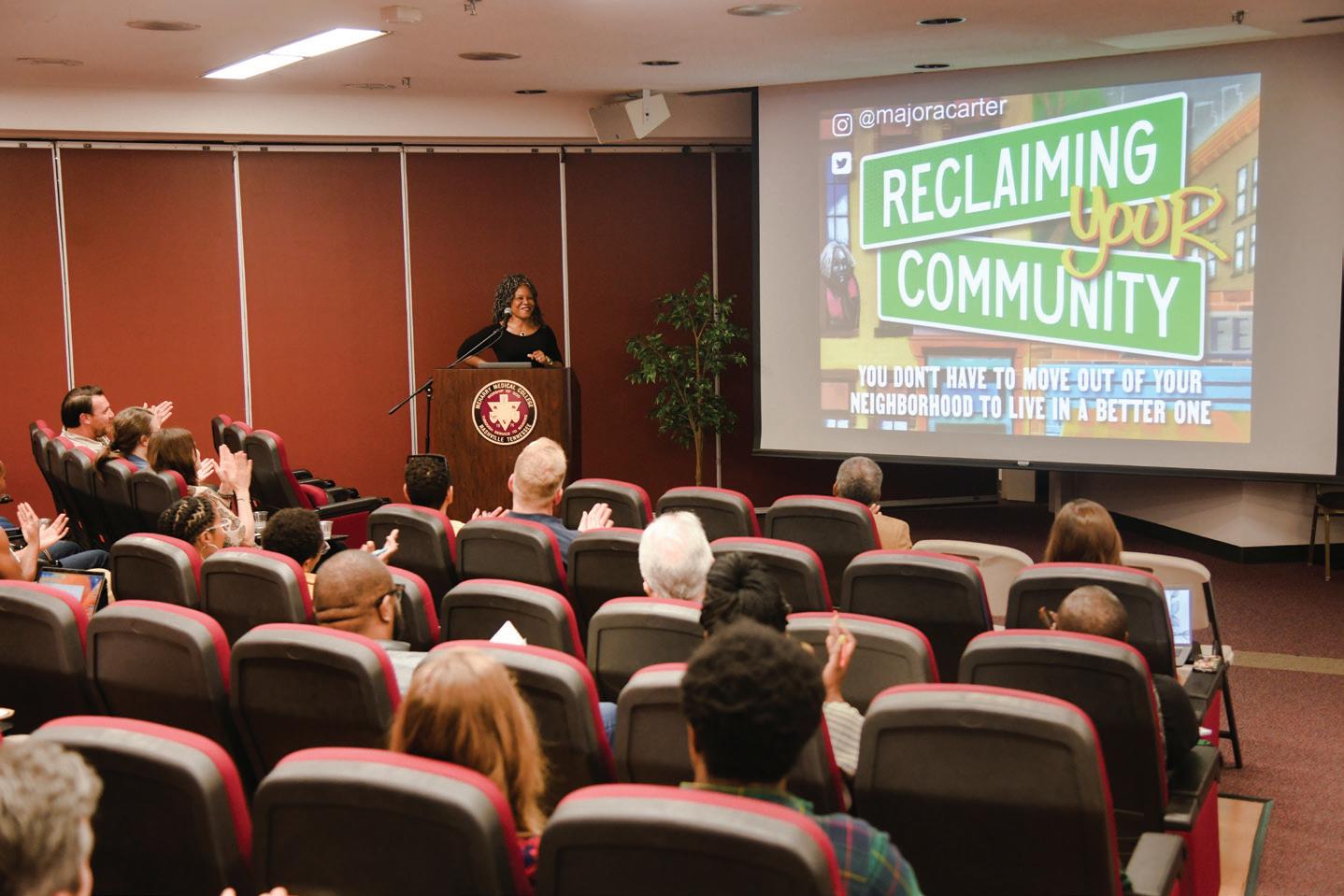
At a recent event put on by the Civic Design Center, the native New Yorker and revitalization strategist presented her ideas about how to revitalize the parts of cities that have been left behind through the years — and doing it without forcing out residents, some of whom have lived there for decades. Her ideas center on “talent retention” and reshaping the status quo for neighborhoods living in poverty.
“Many of us don’t see the value in lowstatus communities, because we’re believing this hype that somehow or another our communities have no value while we’re in them,” Carter told an audience at Meharry Medical School’s Stanley S. Kresge Learning Resource Center on May 23. “And that’s one of the reasons why we measure our success by how far we get away from [where we grew up].”
In 1957, the construction of I-40 began. A significant portion of Nashville’s Jefferson Street, a thriving Black community with successful businesses and clubs, was destroyed by the construction of the interstate right through its center. Since then, despite
various revitalization efforts, the neighborhood has never fully recovered.
It’s a strategy that was widely utilized throughout the U.S. during the 20th century. In fact, the neighborhood Carter grew up in faced similar circumstances in 1948 with the construction of the Cross Bronx Expressway: A once-thriving community was decimated by the construction of a highway and white flight. Over the following decades, companies began disinvesting from the community, and it became harder to find good jobs nearby — until eventually all that was left was municipal infrastructure such as waste facilities and power plants.
“My hometown in the South Bronx is actually the kind of neighborhood that had a talent repulsion strategy,” said Carter. She told the crowd that while the high school she went to was one of the best in the country, she would pass a crack house on her walk to school every day. Those conditions led to many people leaving as soon as they could, and Carter was no exception.
“When I was coming up, the last thing I really wanted to do was stick around,” said Carter. “I only came back to my neighborhood because I was so broke when I started graduate school that I needed to stay with Mommy and Daddy.”
It was during this time that Carter began
service or policy strategy, but a continual practice.
“Planting trees is my exercise — it’s therapeutic,” Solinsky says. “There’s more to it than just, ‘We’re planting trees for this cause.’ This is a way of life.”
When I ask Solinsky about the favorite tree he’s planted, he describes the one he buried his beloved dog Rowan under. Solinksy has dedicated trees to his children, and in honor of a community member after
they died.
“There’s a saying that the best time to plant a tree was 25 years ago, and the next-best time is today,” Solinsky says when asked what he most looks forward to about SoundForest’s future. “In 25 years, I’ll look back at the trees I’m planting today and be like, ‘Dude, it’s so cool to see that they’ve grown this big.’”
EMAIL EDITOR@NASHVILLESCENE.COM
advocating for her hometown. It started with speaking out against injustices being leveled against her community, but she quickly realized she wanted to do more, and that’s how her first project was born — the Hunts Point Riverside Park.
Much of Carter’s work has centered on the creation of what are known as third places: spaces for communities to hang out in that are neither home or workplaces — like parks and cafes. She explained that these types of businesses are typically scarce in communities like the South Bronx. Instead, pharmacies, fast-food chains and pawn shops represent the only ways people can spend money in their communities, and any new development either continues this trend or sparks gentrification.
Her hope is that projects like her Boogie Down Grind Cafe — a coffee shop that occupies the very crack house she used to walk by on her way to school — will help communities begin to invest in themselves, creating more pleasant places to live rather than places people want to leave.
“Successful companies or organizations, they’re not trying to pour resources into those folks so that they go work for somebody else,” said Carter.
Not everyone agrees with Carter’s methods. Nearly a decade ago, she was pushing for a mixed-income housing project in the Bronx that was shot down by the city. Instead it opted for a block of low-income housing, which she calls “the status quo.” And throughout her ascension as a revitalization strategist, she acknowledged during her presentation that some advocates have accused her of being a gentrifier herself, with some even protesting her coffee shop.
“Sometimes, when you stick your stuff out there, not everybody’s gonna like it,” said Carter. “But I promise you, if you know why you’re headed into these things, and you’ve really done your homework and you have every reason to understand that change sometimes doesn’t look really nice in some sectors, but it needs to happen? Then you do it, and you make it happen.”
EMAIL EDITOR@NASHVILLESCENE.COM
At a recent Civic Design Center event, Majora Carter presented ideas about how Nashvillians can reshape their communitiesPHOTO: ANGELINA CASTILLO MAJORA CARTER SPEAKS AT A CIVIC DESIGN CENTER EVENT, MAY 23 TREES PLANTED BY SOUNDFOREST OUTSIDE THE FROTHY MONKEY IN 12SOUTH PHOTO: KATHERINE OUNG SOUNDFOREST SOUNDFOREST.ORG






May 4 - September 3






Reserve












From the KKK to FBI informants and the Council of Conservative Citizens, the roots of vile racist hate run deep in our city
BY BETSY PHILLIPSThe roots of white supremacist organizations in Nashville are somewhat hard to trace since the whole Southern slaveocracy was a white supremacist organization. But it may be fair to start with the granddaddy of all current hate groups, the Ku Klux Klan.
The Klan was founded in late 1865 or early 1866 down in Pulaski, Tenn., by Frank McCord, Richard Reed, John Lester, John Kennedy, J. Calvin Jones and James Crowe. Soon after, famed Confederate Gen. Nathan Bedford Forrest was inducted as the first Grand Wizard of the Klan here in Nashville at the Maxwell House Hotel. Their headquarters was, supposedly, Fort Negley, but newspapers at the time were complaining about the “scoundrel, Leander Woods” a United States Colored Troops vet who, along with his 50-man militia, operated out
of the fort during this time. It’s doubtful they shared the space. Once Reconstruction failed, this version of the Klan fizzled out. Racists no longer needed a secret society through which to terrorize Black people; they could just use the power of the government they came to control.
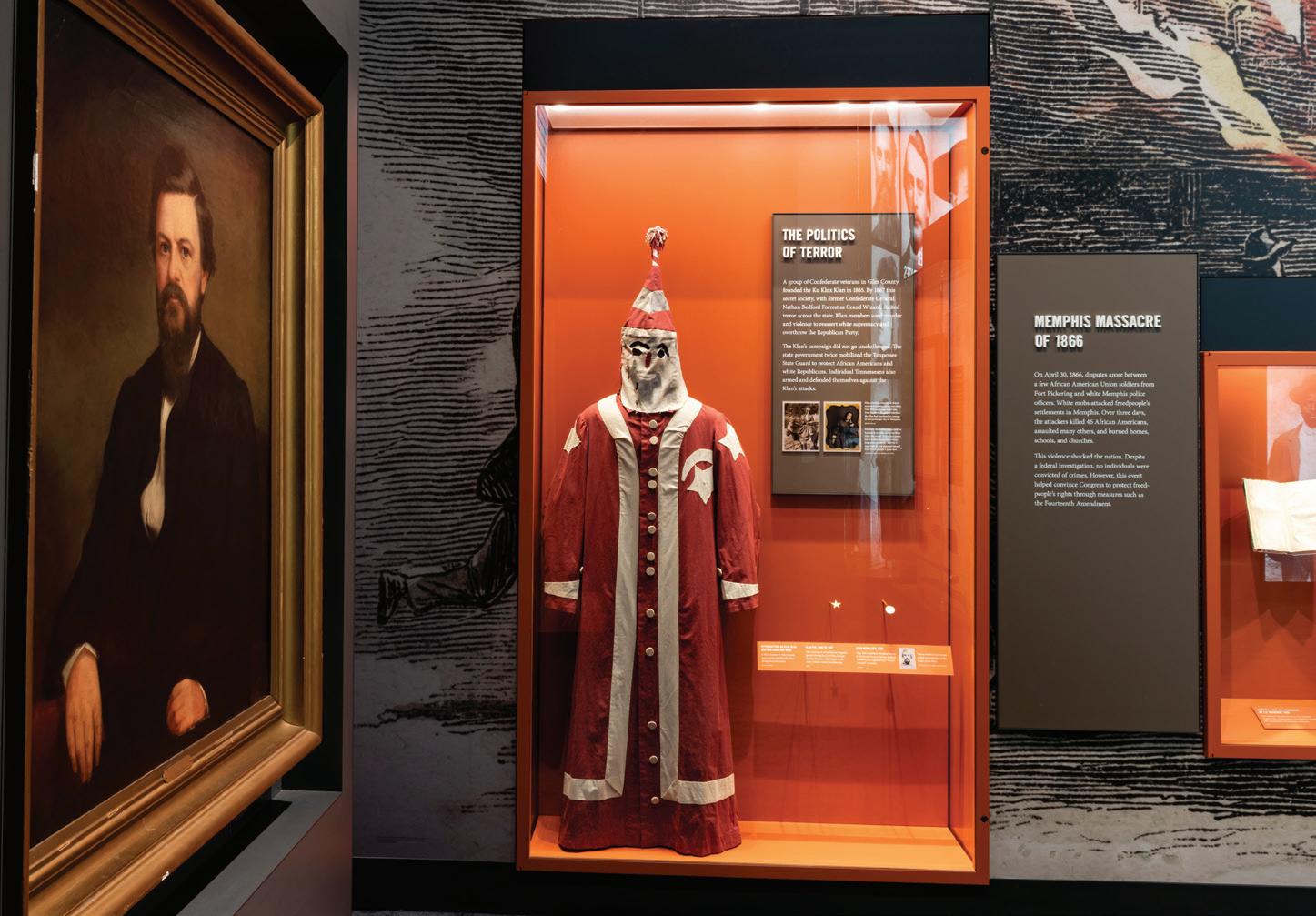
The 1915 release of D.W. Griffith’s film The Birth of a Nation is often credited by historians with the revitalization of the Klan in the United States. Like just about everywhere else, the movie was wildly popular in Nashville and was even made into a play that also was very popular in town. Black ministers, however, denounced the play and called on the mayor to ban it, because “this play never fails to stir up race feelings between the blacks and whites as no other drama does on the American continent to-day.” (Nashville Banner, May 2, 1918, page 4).
But interestingly enough — in spite of the popularity of the Klan throughout the nation and many letters to the editors in the paper blaming anti-Klan sentiment on people trying to destroy President Roosevelt — white people in Nashville seemed only to know someone who used to be in the Klan. When you consider how widely popular the Klan was in the ’20s and ’30s nationally, it is strange that more Nashvillians at the time weren’t bragging about their ties to the organization. It could be that Nashville, with its close ties to the original Klan, felt this new iteration was a little gauche. It’s hard
to be an elite secret terrorist organization when said organization — during its second iteration, at its height — had 2 million people in it.
By 1915, we did have The Fugitives, a group of poets affiliated with Vanderbilt University — including original Klansman James Crowe’s nephew, John Crowe Ransom — who were devoted to creating a poetics of the South. This group later morphed into
the Agrarians, another small group of elite white thinkers who were trying to reframe the South as a tragic Camelot. Poet Donald Davidson was a member of both groups.
Even as the Klan faded away yet again, Nashville was not without racists and racial terrorists. There were more than 50 cross burnings in Davidson County in the 1950s before the third wave of the Klan was very active. But then hit Brown v. Board
of Education in 1954, and in response, the Nashville Catholic Diocese integrated Father Ryan High School and Cathedral High School. Catholic segregationists swarmed to the Klan, and Klan leader Emmett Carr made regular appearances — maskless — in the papers. Once Nashville announced plans to follow suit and desegregate the city’s public schools, the Klan roared back to life and announced its presence with three bombings: Hattie Cotton Elementary School in 1957, the Jewish Community Center in 1958 and the home of city Councilmember Z. Alexander Looby in 1960.
By the mid-1960s, the Klan in Nashville had split into two factions — the Dixie Klan out of Chattanooga and the United Klans of America, being run at that time out of Alabama. The leaders of the Dixie Klan were members of the Brown family and their close compatriots. The leader of the UKA in Tennessee by 1965 was, effectively, J. Edgar Hoover. In 1967, Hoover put out a secret report titled “Ku Klux Klan Investigations FBI Accomplishments,” in which he explained how things worked in Tennessee:
In the early stages of Klan growth in the State of Tennessee, we were able to develop as a Bureau informant the Grand Dragon of the United Klans of America, Realm of Tennessee. Through this highlevel source we were able to control the expansion of the Klan. More importantly, we were able to discourage violence throughout the state. The Klan in Tennessee has not expanded to the proportions it has in other states and its lack of success can be attributed to our highly placed informant. (FBI, 62-116395 n.d.)
Online communities have become havens for hate speech and organizing hubs for extremist
BY ELI MOTYCKAInformation about the FBI’s control of the Klan in Tennessee is hard to come by. When did it start? How long did it go on? The Tennessean in 1981 learned that Tennessee Imperial Wizard Bill Wilkinson had been an informant for the FBI since 1974. So it seems to have gone on from at least the mid’60s through 1981.
Nazis had been on the fringes of Nashville racial circles since the 1950s, when George Lincoln Rockwell, who would go on to found the American Nazi Party, came to Tennessee to help organize the National States’ Rights Party, a political party full of Klan members devoted to segregation. But mostly “Nazi” was an epithet used by Klan members to denote more violent racists and not membership in an actual separate group. However, by the late 1970s, there were open Nazis in white supremacist circles here in Nashville. When racial terrorists attempted to bomb Nashville’s The Temple in 1981, the bombing team was made up of Klan members and neo-Nazis.
Starting with the second iteration of the Klan, Nashville racists were constantly striving to be seen as good people with perhaps quirky beliefs. When local racist Jack Kershaw was hanging out with poet Donald Davidson at Vanderbilt in the 1940s, they believed themselves to be classy — the best of what the South had to offer. When Kershaw was using money Donald Davidson and his buddies in the Tennesseans for Constitutional Government raised in the 1950s to bail segregationists out of jail, it was understood that as sympathetic as Davidson, Kershaw and their friends were to the segregationist cause and as supportive of it as they were, they were not the kinds of men who went to
jail about it. That was for the rabble.
In the 1990s, when Kershaw was a founding member of the League of the South, they fostered for themselves a similarly classy, yet quirky, and ultimately harmless reputation. Yet by the time of the Unite the Right rally in Charlottesville, Va., in 2017, the League of the South was openly in cahoots with the National Socialist Movement, the Traditionalist Workers Party and Vanguard America (which has now morphed into Patriot Front).
Back in the 1950s and 1960s, Nashville didn’t have a very well organized White Citizens Council. This was due in part to the fact that middle-class white people were openly members of the Klan and had no shame in it, and due partially to the existence of the Tennesseans for Constitutional Government and their offshoot groups, like the Parents Preference Committee, which already was a group for segregationists who didn’t want to be associated with the Klan.
But eventually we did have a chapter of the Council of Conservative Citizens, a descendant group of those White Citizens Councils. Even now the CCC advocates against race mixing, immigration and feminism. In 2008, Sheriff Daron Hall went to speak to the Middle Tennessee Council of Conservative Citizens about his department’s participation in the controversial federal 287(g) program. When asked why he would speak to a known and self-avowed white supremacist group, Hall’s spokesperson responded: “He went before that group to provide information about a program that the sheriff’s office participates in. Period. It was not an endorsement of this organization.” Still, our sheriff went to speak to a
white supremacist group. It was not a good look for the sheriff or the city.
The most significant addition to the white supremacist landscape in Nashville has been the decade-long residency of the American Renaissance Conference at Montgomery Bell State Park. American Renaissance touts itself as America’s premier race realist website. The editor, Jared Taylor, is also deeply involved with the Council of Conservative Citizens. Thanks to him and his gathering, white supremacists are able to network while listening to lectures from speakers like John Derbyshire, Richard Spencer, Nick Fuentes, Patrick Casey, Michelle Malkin and former U.S. Rep. Steve King, among others.
In 2018, a different conference headed up by the aforementioned Council of Conservative Citizens and the American Freedom Party brought racists like former Klan leader David Duke and Michael Hill of the League of the South to Montgomery Bell State Park to, again, allow our local racists to hobnob with national figures and network with each other.
The one thing these conferences have illustrated is that, though the names of the groups these folks affiliate with change over time, the people in the groups are pretty consistent and they know or know of each other, going back decades. They’re having long, sustained conversations about their goals and how to achieve them, but we keep treating each time they hit the news as a novel, albeit scary, event instead of as a part of a long tradition of such events in Nashville. ▲
Tennessee’s far-right extremists exist today across numerous related groups that grow, die and change shape across the state. Communities on Facebook and Telegram — an encrypted social media app that hides users’ personal information — have become havens for hate speech and organizing hubs for White Lives Matter Tennessee, regional outfits of the Proud Boys and Patriot Front, and smaller, more localized groups like Tennessee Neighbors for Liberty and Tennessee Nationalists. In these groups, many proudly identify as Nazis (under pseudonyms and screen names) and idolize Adolf Hitler and the Third Reich. Members refer to themselves and others as “patriots” while openly calling for violence against the government and groups that hold protected identities, like race, religion or gender. It’s also clear that these groups play an important social and
political role in their members’ lives, providing validating outlets for hateful thinking and warped understandings of history and current events. Many posts read like the logical extension of adolescent shock humor, where posts trade grown-up Holocaust jokes and fantasize about acts of violence.
The Lewis Country Store brings together far-right culture and politics in a conveniently located gas station on the far-west side of Davidson County. The store is owned by Brad Lewis, brother of well-connected Nashville lawyer Bryan Lewis, both sons of the late Nashville real estate mogul and convicted gambler Jimmy Lewis, who died of COVID in 2020. The Scene reported on an extended drama involving Brad Lewis, former Metro police Maj. Carl Dollarhide, and NewsChannel5’s Phil Williams in 2001. When the Scene visited the store last week, Patty, the general manager, wrote down our request for comment, which was not returned as of press time. Patty did not give her last name.


Lewis’ outpost on the outskirts of Davidson County has been a far-right meeting point for years and a beacon of offensive political material. Interior and exterior decor celebrates guns and former President Donald Trump. A sign on the door mocks COVID safety measures, and the roadside digital marquee cycles between vulgar memes about Hillary Clinton and climate change. The gas is consistently 20 cents cheaper than competitors, generating lines at almost every pump. The
“LewisCountryStore” group had more than 400 followers on Telegram until it abruptly disappeared during the reporting of this story. According to screenshots shared by a former member, Lewis uses the space to share more explicitly offensive content. In one post, a shirtless man who appears to be Lewis performs a Nazi salute.
These groups are constantly aware that they may be under surveillance by opposition groups or law enforcement. Anna, a mother in Middle Tennessee, got involved in far-right surveillance when she learned that information about her and her family
had been shared in a Tennessee “Christian Coalition” Facebook group. She spoke to the Scene on the condition of anonymity out of a concern for her safety and the safety of her foster children.
“I quickly found out that local LGBT people in my community were having their picture taken with their kids in the street, and people were posting it on Facebook,” Anna tells the Scene. She’s one of several Tennesseans who have over the past year built accounts on Facebook and Telegram that have allowed them to monitor far-right groups. From there, she collects information







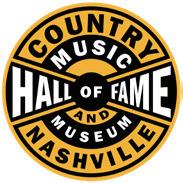





about far-right organizing and tips off their targets, specifically queer spaces and drag events. She expects there to be an uptick in anti-LGBTQ efforts during this month’s Pride events.
“Most of the groups I watch are openly Nazis,” says Anna. “They get shut down after a while, go undercover or start another group. I just got into it because someone else warned me. The last thing you want in Tennessee is to have that target on your back from thousands of Nazis.”
According to Anna’s research, Tennessee’s Patriot Front chapter has 7,000 members, and the Proud Boys chapter has nearly 2,000. She recalls that when she started learning more about the far-right presence in Tennessee, she was struck by their virulent antisemitism, a topic that occupied members’ discussion more than any other identity. Antisemitic incidents have rippled across Nashville this year, including propaganda distribution and vandalism in Sylvan Park, East Nashville and 12South.

To earn designation as a “hate group” by the Southern Poverty Law Center, an organization must “vilify others because of their race, religion, ethnicity, sexual orientation or gender identity.” According to the Alabama civil rights nonprofit, there are 28 hate groups in Tennessee. A few are KKK offshoots and white supremacist gangs, but a formidable strain of Tennessee’s far-right momentum continues to form at the intersection of Christian extremism and LGBTQ hate. Regional religious figures Greg Locke,
Steve Berger and Rich Penkoski blend theology and far-right politics, using the “pastor” title to back hate speech. This is the constituency fed by conservative media like Fox News and the Daily Wire and dogwhistled by GOP politicians like Trump, Ron DeSantis, U.S. Rep. Andy Ogles and Gov. Bill Lee. Together they oppose a multiracial, multiethnic society diverse in religion, gender and sexuality — support for that vision is maligned by the right as “woke ideology.” They therefore identify as “anti-woke,” an identity-obsessed banner that has been embraced by politicians and anonymous posters in their shared mission to preserve a Christian society defined by white supremacy and patriarchy, uniting these actors under another label: “alt-right.”
Across all of Tennessee’s hate groups, members share and construct their own understanding of history and current events. They cherish martyrs and draw from a vast
bank of symbols and ciphers. A recent fundraiser at the Lewis Country Store raised $1,100 for two “J6” families, presumably now facing legal consequences for attempting to violently overthrow the federal government on Jan. 6, 2021. The Gadsden Flag — a historical U.S. flag, yellow with a snake and the warning “DONT TREAD ON ME” — featured prominently that day in D.C. Once a Revolutionary War symbol aimed at the British monarchy, that snake has become a catch-all symbol for resistance, co-opted by several different entities on the American political margins but most recently associated with the right’s resistance to taxes and COVID safety measures. It’s also more widely socially accepted — unlike a swastika or Confederate flag. In 2017, Tennessee’s Gadsden Flag license plate was outside the year’s top 10 specialty plates as reported by the Tennessee Department of Revenue. But last year, Gadsden was No. 1, with

Davidson County’s neighbor to the south is one of the wealthiest counties in the nation — and rife with extremist ideology
BY MATT MASTERSWilliamson County is the wealthiest county in Tennessee, and among the wealthiest in the nation. It’s home to celebrities, multimillion-dollar corporate headquarters and megachurches — as well as some of the most powerful and influential Republican politicians in the state, who are guiding Tennessee further into a right-wing reality. Among their ranks are Gov. Bill Lee, U.S. Sen. Marsha Blackburn and state Senate Majority Leader Jack Johnson, who have worked to shape the state in the name of “conservative family values.”
Blackburn founded the Williamson County Young Republicans and served as the chair for the Williamson County Republican Party from 1989 to 1991. She served in the Tennessee Senate and later in the U.S. House of Representatives prior to her election to the U.S. Senate in 2018. She’s a fa-
vorite of Republican supporters and donors in Williamson County, but rarely appears in front of constituents who aren’t all-in on the GOP agenda, having faced public criticism at her last town hall in 2017.
She is also a die-hard supporter of former President Donald Trump, and has already joined fellow U.S. Sen. Bill Hagerty in endorsing Trump in his 2024 bid to return to the White House. Blackburn has preached party unity, both locally and nationally, as key to the success of the GOP, saying in 2020, “Williamson County is what holds that great, red wall together” — a sentiment she reiterated last month when speaking at a Republican Women of Williamson County meeting in Franklin. The unity behind Trump remains strong despite evidence that Blackburn, Hagerty and Tennessee’s U.S. Rep. Mark Green might have been far more informed about, if not involved in, the former president’s attempts to illegally stay in office after losing the 2020 election — culminating in the Jan. 6 insurrection at the U.S. Capitol in Washington, D.C. Many local Republican Party officials and voters also expressed their belief that the 2020 election was “stolen” from Trump, with some taking part in numerous “Stop the Steal” rallies throughout Middle Tennessee. In 2022, Blackburn, Green and Hagerty all appeared at the Faith and Freedom Coalition’s Road to Majority Policy Conference in Nashville, where Trump dismissed evidence of the coup attempt.
In 2020, Franklin-based security consultation firm Atlas Aegis was accused of attempting to deploy former special forces personnel
to intimidate voters in Minnesota on Election Day, a plan that was canceled after it was challenged in court. That year also brought unfounded fears and rumors of planned riots by “Antifa” in the streets of Franklin and surrounding communities as community members across Williamson County took part in numerous protests against racial injustice following the murder of George Floyd. Several of the peaceful protests in
28,616 plates issued. While the additional plate fees have raised more than $476,000 for East Tennessee’s Sycamore Shoals State Park, the plate’s connotations to the right are widely understood, if vague.
These groups feed on the state’s long lineage of white supremacy. The Confederacy, specifically, remains a key bloodline for today’s movements, and legitimizing gestures — like stated support for (or failures to condemn) the far right from lawmakers — matter a great deal to their ranks.
Tennessee lawmakers reaffirmed April as Confederate History Month this year, days after they expelled two Black lawmakers from their body for joining protests against gun violence.
Given oxygen and nourishment, these groups will grow stronger. Intimidation will continue to sprout violence. Or, with sustained opposition, they shrink into nothing, like a cancer. ▲
Williamson County were met with hecklers, middle fingers, verbal threats of violence, racial slurs and other forms of intimidation from counter-protesters.
In 2022, Blackburn and Johnson participated in an anti-trans rally in Nashville organized by right-wing media figure Matt Walsh. Johnson, of Franklin, made good on his promise at that rally to introduce legislation to ban trans health care for minors. He
“My fiancée and I don’t usually eat breakfast out, but The Wa e Taco — I-24 on Bell Road — is changing our minds. The food is delicious, freshly prepared, generously portioned and reasonably priced.”






—Stephen Trageser, The Nashville Scene

Located only minutes from downtown & East Nashville.


served all day!




also introduced legislation that criminalizes drag performances where children could be present. Both bills were signed into law and now face legal challenges. Also in 2022, the white nationalist group White Lives Matter protested Franklin’s Juneteenth Festival, an incident that highlights the tensions surrounding how Williamson County remembers and acknowledges its past.
In April of this year, the Williamson County Republican Party saw its latest shakeup, with a clean-sweep vote leading to the removal of now-former party chair Cheryl Brown, the first Black woman to serve in the role, and the election of Tracy Miller. Miller has strong ties to the state GOP and a history of legal troubles that have caused tensions among some Republican voters in the county, along with allegations of fraud and corruption.
Miller called Williamson County “the swamp,” while Brown characterized the takeover as a hijacking of the party in coordination with Gary Humble, who lost his own state Senate primary race against Johnson in 2022. Humble runs Tennessee Stands, a Franklin-based group that protested many public health measures throughout the pandemic.
Humble previously told Scene sister publication The News that there is “deep divide in the Republican Party.”
It’s not just elected officials who are fighting right-wing culture wars in Williamson County, with activists and local celebrities taking up far-right causes, often focused on children and schools. From challenges to now-expired COVID-era policies to charter schools, debates over critical race theory (however misapplied that term often is) and ongoing efforts to challenge the presence of some books in school libraries, right-wing activists’ attention on schools has intensified.
In 2022, school board elections became officially partisan in Williamson County. In March of that year, Williamson Families — a Franklin-based right-wing political action committee formed in 2021 — endorsed its first round of school board and county commission candidates. As with the Tea Party movement more than a decade before it, the group (made up of registered Republicans and independents) champions familiar fiscal and social conservative values, along with the equally familiar pairing of God and country, freedom and Christ, and references to former President Ronald Reagan — all while taking aim at “woke ideology” framed as part of an ongoing “war” led by “Christian warriors.”
Williamson Families chair Robin Steenman also serves as the chapter chair of Moms for Liberty Williamson County, an organization whose stated mission is “fighting for the survival of America by unifying, educating and empowering parents to defend their parental rights at all levels of government.” Though Steenmen has pushed back against the “extremist” label, Moms for Liberty’s influence and action in Williamson County has stretched beyond voicing concerns on social media and showing up for public meetings, as the group regularly hosts advocacy meetings and guest speakers, from local elected officials to right-wing media figures like the
Daily Wire’s Michael Knowles. Williamson County students and youth groups have also expanded further into right-wing activism, beyond the traditional scope of young Republican groups and into high school and college chapters backed by the right-wing nonprofit Turning Point USA. In 2022, rightwing activist and political commentator Benny Johnson served as the guest speaker for an event hosted by the TPUSA Nolensville High School chapter, coaching students of all ages on how to fight the “culture war” with memes and ridicule.
A frequent target of Moms for Liberty and Williamson Families is Williamson County Schools board member Eric Welch, a Republican who has been labeled by the groups as “the left’s secret weapon.” Welch has served on the school board for more than a decade and says that while he believes there is a growing “vocal minority” of “extremists” within Williamson County’s population, he characterizes the community as generally holding mainstream conservative views. Welch has also said Williamson County and much of Tennessee is subject
to the reality of one-party rule, leading to a prominence of groups proclaiming ideologies in search of a problem.
“It’s not based on an educated point of view,” Welch says. “They haven’t taken the time to sort of ask questions and find out what’s going on. It’s, ‘This is what I think,’ and then what we look for is any rumor or indicator that supports that point of view without really questioning, ‘Am I getting this from a person or source that would be in the know?’”
In August 2021, public debate about face masks for elementary school students came to a head. Hundreds of people attended a Williamson County Schools board meeting, with a crowd of anti-mask protesters devolving into a mob that harassed several pro-mask community members, including parents and medical professionals. One WCS parent was chased to his car and surrounded by anti-mask protesters (some of whom were neither parents nor residents of Williamson County), with one man shouting, “We know who you are, and we will find you.” The incident was reported on by The
News, formerly known as the Williamson Home Page, and drew widespread condemnation, including from President Joe Biden. Nearly a year later it became clear that no charges would be filed against any of the people threatening parents — in part because the man who was chased and harassed by protesters feared retaliation.
Welch says it’s important for everyone, especially parents, to get more involved and engaged in their communities and their elections.
“If they don’t get involved and make their voice heard, there’s going to be people who do it for them, and it’s not going to be the people that they want,” Welch says. “If they don’t speak up, you remain silent, all the decisions in this county are going to be made by people with agendas and points of view and belief systems that do not align in any way, shape or form with their own.”
Williamson County is defined in large part by the Christian faith of the majority of its residents. But a dissenting voice is Franklin Community Church pastor Kevin Riggs, a vocal critic of right-wing ideologies — specifically evangelical dominionism, noting that he sees Williamson County as “the capital of Christian nationalism.”
“What you have is people trying to build ‘the kingdom of Christ,’ but they’re doing it the same way you build the empire, and that’s anti-Christ,” Riggs says. “Yet it’s hard to convince people of that, because they’re hearing it from the pulpit, it’s what they’re reading in the Christian literature, and so they’re convinced that they’re following the mandate given them by God.”
Riggs specifically cites the recent divisive vote over the 2022 Franklin Pride Festival. Hundreds of people showed up to a meeting of the Franklin Board of Mayor and Aldermen in April to protest Pride, including many local faith leaders and dozens of community members who said they were “shocked” by last year’s drag performances.
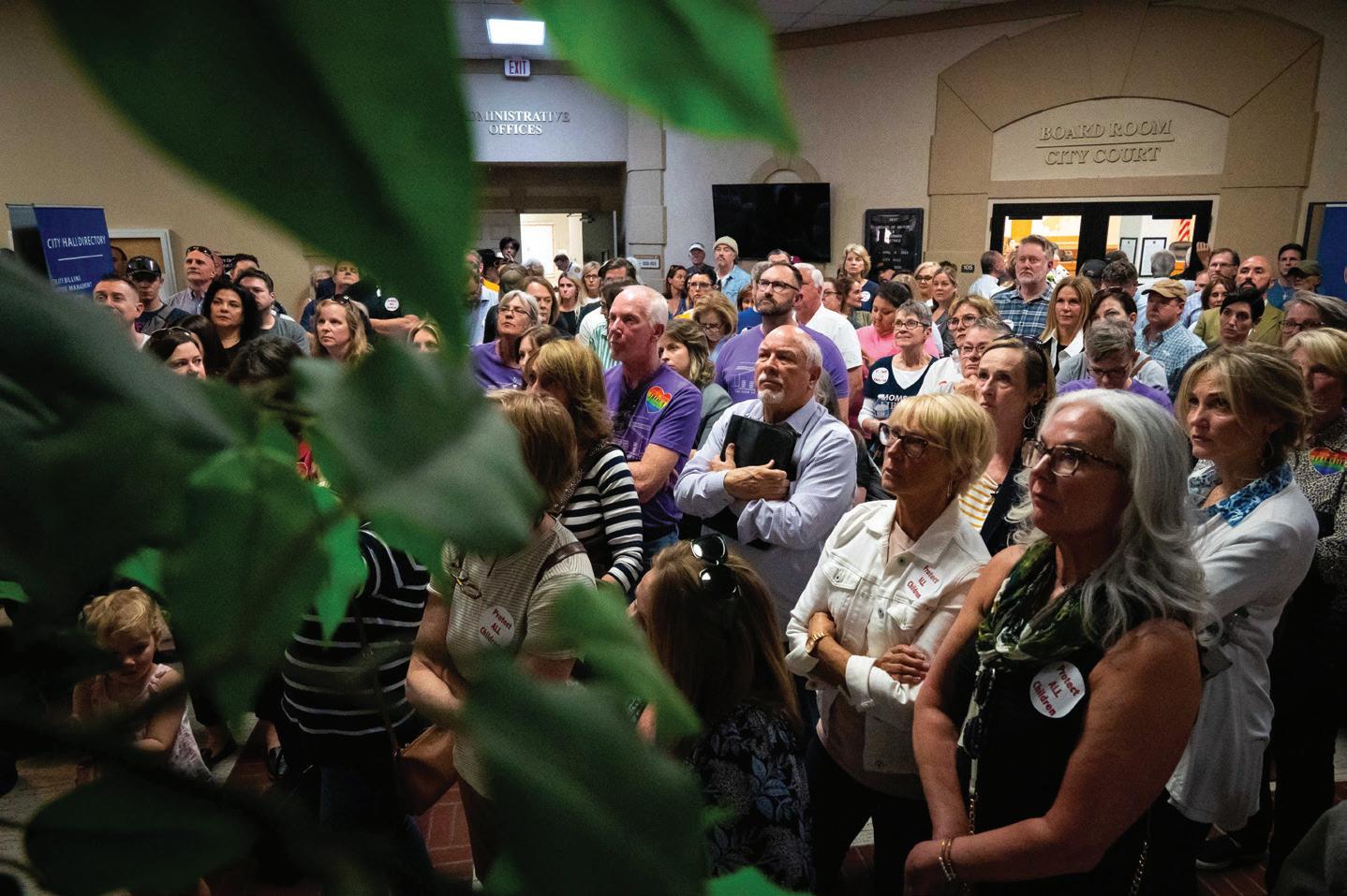
Riggs says he doesn’t believe most Williamson County residents know about or specifically subscribe to the ideas of Christian nationalism. But, he says, many faithful Christians are swayed to not challenge the ideals that are preached in some churches — ideals that he says trickle into the arenas of business, education, politics and government. Riggs warns that the power of the pulpit is not only vital to the growth and success of extremist right-wing movements, but that politics can hold sway over the churches themselves.
“I don’t know anyone who’s had to step down from the church because they’re too far to the right,” Riggs says. “But I know lots of people who have had to step down because they were perceived to have gone too far to the left.”
Riggs fears that if Christian nationalism continues to take hold in Williamson County and Middle Tennessee, marginalized communities could increasingly become the targets of violence in the name of Jesus.
“All wars are bad,” he says. “Holy wars are evil. And so if I [can] convince myself that I’m killing you for a righteous cause, then that’s dangerous.”
“IF THEY DON’T SPEAK UP, YOU REMAIN SILENT, ALL THE DECISIONS IN THIS COUNTY ARE GOING TO BE MADE BY PEOPLE WITH AGENDAS AND POINTS OF VIEW AND BELIEF SYSTEMS THAT DO NOT ALIGN IN ANY WAY, SHAPE OR FORM WITH THEIR OWN.”
— WILLIAMSON COUNTY SCHOOLS BOARD MEMBER ERIC WELCH







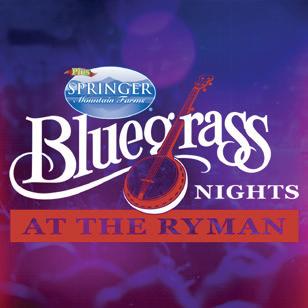

















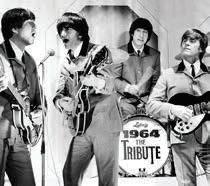










MUSIC
[WORK THIS TIME, AND THIS TIME, AND THIS TIME] KING GIZZARD AND THE LIZARD WIZARD
Psychedelic face-melters King Gizzard and the Lizard Wizard have released three studio albums since they performed at Bonnaroo last year. If that’s not enough for you, they have a new record coming in June with a title that’s long enough for several more — PetroDragonic Apocalypse; or, Dawn of Eternal Night: An Annihilation of Planet Earth and the Beginning of Merciless Damnation. According to singer Stu Mackenzie, the forthcoming metalleaning album is a nod back to 2019’s more experimental Infest the Rats’ Nest. It’s yet another in the band’s seemingly constant barrage of releases, from fresh material to recordings of old shows and more. It feels as though the band is both running a sprint and a marathon in their own trippy, timewarped “Gizzverse,” and while their merch and media floweth aplenty, live shows in the United States are a bit harder to come by. It’s quite a trek from their home in Australia, after all. We’re lucky that King Gizz is returning to Tennessee so soon as a part of their “residency tour,” settling in at a handful of venues across the country for a few nights each, including our very own Caverns in Pelham. While they originally planned for three dates in June, those shows quickly sold out, so they added another. Tickets are limited, but (as of press time) you can still snag a ticket for standing room at the venue’s outdoor amphitheater for Sunday’s set. June 1-4 at The Caverns, 555 Charlie Roberts Road, Pelham, Tenn. KELSEY BEYELER
Kennie Playhouse Theatre returns this weekend with Melda Beaty’s compelling drama Front Porch Society. The story follows a group of elderly Black women in rural Mississippi on the eve of Barack Obama’s historic 2008 election. It was a significant moment to be sure, particularly for those who have endured the injustices of Jim Crow and the struggle for civil rights. But amid all the optimism and excitement, Carrie Honey is still grieving the tragic death of her son — and feeling that the idea of “hope and change” is just a pipe dream. The cast, directed by Kenny Dozier, includes Chantea Kirkwood as Carrie, along with Keisha R. Cunningham, LaJuanda Thompson, Sondra Glynn, Sabrina Birdine-Moore and more. Audiences can also look forward to a special talkback event with playwright Melda Beaty following the June 3 performance. June 1-11 at the Z. Alexander Looby Theater, 2301 Rosa L. Parks Blvd. AMY STUMPFL
[MEXICO’S FINEST] DURANGO FEST
On Friday, Plaza Mariachi will host one of the strongest lineups of Mexican music stars to ever set foot in South Nashville. But while the term “Mexican music” is incredibly vague, the name “Durango Fest” tells you everything you need to know. Duranguense, which rose to prominence in the mid-2000s out of the Mexican state of Durango, is an idiosyncratic blend of traditional Mexican banda music with Casio- and Korg-laced technopolka and 2000s Latin pop. On first listen, it may come off as slightly saccharine, but within a few
songs, you’re whisked off into a glorious world of arpeggiated keyboards, rolling snare sections, lighthearted pop melodies and soaring vocals. It’s at once danceable and entrancing, and it’s easy to see why the genre consistently topped the charts during its commercial heyday. Durango Fest will bring together the cream of the Duranguense crop for a star-studded “blink and you’ll miss it” event. K-Paz De La Sierra, Patrulla 81, Alacranes Musical and Grupo Montez de Durango is an eyepopping list of Duranguense specialists, while Diana Reyes, widely known as the Queen of Duranguense Music, brings a much-appreciated pop diva essence. 7 p.m. at Plaza Mariachi, 3955 Nolensville Pike
ALIJAH POINDEXTERBassist Greg Bryant and keyboardist Paul Horton — the performing, composing and improvising duo at the heart of Concurrence — prefer the term “Black creative music” for their work. It shares a lot in common with the rainbow array of music you might think of as “jazz,” but Horton and Bryant and their collaborators pull an array of other rich traditions into their orbit, including funk grooves and hiphop beatcrafting. As Bryant told longtime Scene contributor Ron Wynn in 2019: “If you call us a jazz band, it gets into certain types of expectations. … The biggest problem with improvisational music is folks have

too often been told what they should and shouldn’t be hearing.” Bryant and Horton founded the group in Nashville, where they lived for many years; they’ve moved elsewhere, but they try to convene in Music City as often as possible. They’ll stop in at Rudy’s on Friday with seasoned drummer Derrek Phillips joining in. Bryant will be back at Rudy’s on Saturday as part of the ensemble supporting his wife and musical partner Dara Starr Tucker, an exceptional jazz vocalist and songwriter. The show serves as a Nashville release party for her new self-titled record, featuring originals and a selection of covers originally performed by artists ranging from Billie Eilish to John Denver and beyond. June 2-3 at Rudy’s Jazz Room, 809 Gleaves St. STEPHEN TRAGESER
DECK MOUNTAIN
Spotlights occupy a sonic space few artists can survive. Their music’s aggression comes from gunning their engine in the lowest gear — never too fast, but with more torque than their governed tempo would allow other bands. Their atmospheric heaviness draws a lot of comparison to Shiner or Hum, but their new album Alchemy for the Dead reminded me of a fuzz-pedal-fueled version of Blonde Redhead. Though their home is Pittsburgh, the threesome seems to spend a lot more time living out of their tour van than in the Steel City. Kicking off the three-band show will be the swirling psychedelia of Tape Deck Mountain along with My Wall, a visceral quartet who incorporate some of my favorite black elements: Flag, Sabbath and metal. 8 p.m. at Drkmttr, 1111 Dickerson Pike P.J. KINZER
MUSIC
Disney animators as well as a Q&A on his prolific voice acting career. June 3-4 at The Fairgrounds Nashville, 625 Smith Ave.
ALEJANDRO RAMIREZ[UNDERNEATH THE SUN]
Not long after the birth of La Luz singersongwriter/guitarist Shana Cleveland’s first child, the COVID-19 pandemic put Cleveland’s career on hold, but her greatest challenge awaited just around the corner. A breast cancer diagnosis in spring 2022 truly brought her life into perspective. Yet, throughout such intense adversity and healing, Cleveland’s artistic resolve deepened. La Luz creates introspective guitar-pop through the rose-colored lens of retro surf-obscura, as heard in the band’s 2022 single “Endless Afternoon.” On the ode to dreamy Californian days, Cleveland waxes poetically within the effervescent haze of reverb. Accompanied by haunting harmonies and throbbing tremolo-laden electric guitar, she sings, “I’d do anything to keep you safe.” On the heels of a spectacular Audiotree Live session, transcendent indiesoul artist JayWood sets the stage. 8 p.m. at the Blue Room at Third Man Records, 623 Seventh Ave. S. JASON VERSTEGEN ART
for his music, most notably his work with The Mekons and The Waco Brothers. But Langford is also an accomplished visual artist, a fact that has become evident in Nashville through his acclaimed work with the Country Music Hall of Fame and Museum. Some of his work for the Hall has teamed him with Jim Sherraden of Hatch Show Print, an award-winning longtime printer and printmaker. Langford, aka Father Drogo, and Sherraden, aka Bishop Biscuit, have joined forces again for an exhibit at Hatch’s Haley Gallery, Complicated Characters: The Collaborative Works of Jon Langford and Jim Sherraden, which opens Saturday. “As a musician, I’m really used to collaborating,” Langford tells the Scene. “Making visual art is a trickier business. It can be a solitary activity. Jim Sherraden is the first person I’ve been able to make art with where the collaboration really works and drives the things we make into complicated areas we would probably never dare to go alone.” Saturday afternoon in the gallery, Hatch will host an artist reception that is open to the public and will include a musical set by Langford with accompaniment from Pete Finney, Jim Gray and Paul Burch. Opening reception 5-8 p.m. Saturday, June 3; through July 31 at the Hatch Show Print Haley Gallery, 224 Rep. John Lewis Way S. DARYL SANDERS
whatever magic he has is no fluke. Get there early for Crooked Rhythm Band No. 1 and the rapturous guitar jangle of Rose Hotel. 8 p.m. at The Basement East, 916 Woodland Ave. P.J. KINZER

[GEEK OUT]
NASHVILLE COMICON
Break out the PVC props and various capes and cloaks: Nashville Comicon returns to The Fairgrounds Nashville. The two-day event will feature a variety of vendors slinging collectibles of all kinds, voice actors from animation and video games, cosplay contents, autograph booths and a slew of panels. Keep an eye out for Nashville resident Jason Marsden, who’s hosting a pair of panels related to
As the Belcourt’s excellent 1973 series cruises into its final batch of releases from half a century ago, one film stands out as among the most groundbreaking of the entire collection: French writerdirector René Laloux’s Fantastic Planet. An experimental animated sci-fi film, Fantastic Planet isn’t exactly the same kid-friendly effort as Disney’s Robin Hood, which ran earlier in the series — unless your kid is ready for some trippy allegory. Set in the distant future on a planet called Ygam, Laloux’s film follows the conflict between Traags (enormous blue humanoids) and Oms (human beings, stolen away from Earth and kept by the Traags as pets). Some critics over the past 50 years have interpreted Fantastic Planet as a take on the civil rights movement, or the animal rights movement, while others insist it’s the perfect movie to experience while under the influence of psychedelics. (Gene Siskel, for what it’s worth, hated it.) However you approach it, it’s worth seeing on the big screen at least once, if only to hear Alain Goraguer’s funky psych-jazz soundtrack on the Belcourt’s magnificent sound system. June 3, 5 & 7 at the Belcourt, 2102 Belcourt Ave. D. PATRICK RODGERS
With Serpico — released just a couple months after Gene Hackman’s NYPD cop Popeye Doyle broke all the rules in
[FATHER DROGO MEETS BISHOP BISCUIT]
Welsh-born Jon Langford is best

[GET RICH OR DIE TRYIN’]
Michael Ruth moved to Nashville as a member of Goshen, Ind., expats Kansas Bible Company, a band with enough musicians to fill a jury box. But after leaving his rural jurors and adopting the Rich Ruth moniker, Michael created something far more celestial. Rich Ruth’s 2022 album I Survived, It’s Over is a meditative masterpiece celebrating the cerebral side of music and earning Ruth worldwide acclaim. His whirring oscillators and modal saxophones take listeners on an enchanted pilgrimage through spacetime, sharing parallel orbits with albums like Miles Davis’ In a Silent Way, Vangelis soundtracks or Sleep’s Dopesmoker. Ruth boasts a fantastic new live album and his recent Settling In EP, confirming that
JON LANGFORD AND JIM SHERRADEN: COMPLICATED CHARACTERS
known
Saturday, June 3
SONGWRITER SESSION
Carson Beyer and Michael Lotten
NOON · FORD THEATER
Sunday, June 4
MUSICIAN SPOTLIGHT
Nick Scallorn
1:00 pm · FORD THEATER
Friday, June 9
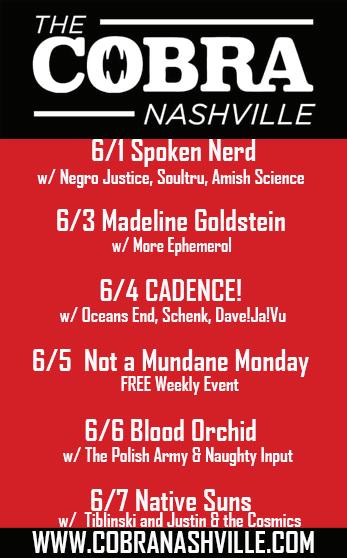

CONVERSATION
AND PERFORMANCE
featuring Kimberly Kelly, Catie Offerman, MaRynn Taylor, Kasey Tyndall, and Julie Williams
12:30 pm · CMA THEATER
Saturday, June 10
SONGWRITER SESSION
Laura Veltz
NOON · FORD THEATER
WITNESS HISTORY
Museum Membership
Receive free admission, access to weekly programming, concert ticket presale opportunities, and more.

Saturday, June 10
FILM SCREENING
2:30 pm · FORD THEATER
Sunday, June 11
MUSICIAN SPOTLIGHT
Ilya Toshinskiy
1:00 pm · FORD THEATER
Saturday, June 17
SONGWRITER SESSION
Erin Enderlin
NOON · FORD THEATER

Sunday, June 18
MUSICIAN
Kristen Wilkinson
1:00 pm · FORD THEATER
Saturday, June 24
SONGWRITER
Adam Wood
William Friedkin’s Oscar winner The French Connection — Al Pacino and director Sidney Lumet tell the less-action-packed (but equally intense) story of a more straight-arrow member of New York’s Finest. Pacino is at his bearded best as real-life whistleblower Frank Serpico, an unconventional officer who goes on a mission to expose the corruption going on all through the police department. Much like French, it’s a down-and-dirty New York movie. (I’m so glad the Belcourt will be appropriately showing it in glorious 35 mm!) Lumet shot in more than 100 locations in the Big Apple, often surrounding Pacino with New York actors (Tony Roberts, John Randolph, M. Emmet Walsh, even F. Murray Abraham and Judd Hirsch in uncredited roles) who would go on to be familiar, veteran faces. Think of this biopic as the spiritual prequel to the next Pacino-Lumet collab, 1975’s Dog Day Afternoon, in which Pacino plays another real-life New Yorker — but on the opposite side of the law. June 3 & 7 at the Belcourt, 2102 Belcourt Ave.
CRAIG D. LINDSEYNashville-based singer-songwriter
Bea Troxel is returning from a multicity run for a hometown show at the East Side’s Drkmttr. Her folk songs can only be described as literary, though praise for her lyricism should not overshadow Troxel’s voice, distinctive and longing. Check out the title track of 2021’s Gettin’ Where for a taste. Her 2017 album The Way That It Feels offers another example of Troxel’s abilities as a storyteller, evocative of a rainy morning or campfire gathering. She’ll be joined by collaborator Hannah Dorfman and local alternative group Volunteer Department on the lineup. 8 p.m. at Drkmttr, 1111 Dickerson Pike. STEPHEN ELLIOTT

[NA NA NA NA, HEY HEY HEY]
FILM
1973: THE LONG GOODBYE
FILM
1973:
The 50th anniversary edition of CMA Fest — which folks who lived here or attended the festival between the inaugural event in 1972 and its 2004 name change will know as Fan Fair — is set to bring a massive amount of mainstream country music talent and a tidal wave of fans to Music City from June 8 to 11. As ever, there are tons of ancillary events that country aficionados will want to check out before the festivities get underway, and a handful of them caught our eye.
BLUEY
CHILDREN [BINGO!]
Bluey is the one kids’ show you’ll catch me watching when my children aren’t in the room. Or, as my 9-year-old says, “It’s the only baby show that’s not cringe.” (Everyone’s a critic.) The cartoon follows an Australian blue heeler puppy and her lovable family through a series of funny and unpredictable situations. The relatable, realistic glimpses of everyday family life are utterly charming. With educational — yet entertaining — storylines, Bluey is a show that contains multitudes. Bluey’s Big Play features gigantic plush puppets of the show’s 2D characters, a cascade of balloons released into the audience for a game of “Keepy Uppy,” and bubbles raining down from the ceiling. I don’t know who will love it more: me or the kids. June 3-4 at TPAC’s Jackson Hall, 505 Deaderick St. TOBY ROSE

Stoner noir fans will have the opportunity to witness the genre’s genesis on the big screen with upcoming showings of Robert Altman’s The Long Goodbye as part of the Belcourt’s series on the films of 1973. This ambling anti-mystery caused frustration among many first-time viewers — myself included, as Raymond Chandler’s novel from which the film was adapted is one of my all-time favorite books — due to the usual Altman upending of expectations. But the film has received a major reevaluation in recent years for being far ahead of its time. From the Coen brothers’ cult classic The Big Lebowski to Paul Thomas Anderson’s excellent Thomas Pynchon adaptation Inherent Vice and David Robert Mitchell’s criminally underrated Under the Silver Lake, its influence among modern filmmakers is pervasive. So grab your trusty cat sidekick and stumble your way down to the Belcourt to watch Elliott Gould play iconic detective Philip Marlowe in all his ’70s glory. June 4, 6 & 8 at the Belcourt, 2102 Belcourt Ave. LOGAN BUTTS
Back in 2018, the Belcourt’s Essential Westerns series brought 26 features to the screen, showing how flexible the genre is. The Scene’s D. Patrick Rodgers said of the series: “The Western may indeed be the American artform. The genre is as old as cinema itself … and so ubiquitous that its parodies are parodied, its tropes deeply ingrained in the American psyche and lexicon.” There’s no doubt that this and more was on the mind of embattled director Sam Peckinpah when he set out to direct Pat Garrett and Billy the Kid. The story riffs on the legendary friendship of the titular characters, and it’s every bit revisionist. Garrett (an extra salty James Coburn), a newly minted sheriff looking out for the special interests of cattle barons, pledges to bring in the lawless but charming Billy the Kid (then-newcomer Kris Kristofferson). The tension in the story revolves around the past that Garrett and Billy share. Though never really articulated, the men were once the same, but have since diverged, and the viewer is left to ponder who is the better man. The supporting cast includes Slim Pickens and Harry Dean Stanton, with the best turn made by Bob Dylan as the mysterious knifeman Alias, who comes to Billy’s aid. Dylan also wrote the score, which includes the hit Knockin’ on Heaven’s Door. But the title theme is what really soars, revealing all of the emotions about friendship and betrayal that the men — killers and thieves, both of them — can’t express themselves. Peckinpah was reportedly a monster on the set, and he lost 18 minutes of his film when MetroGoldwyn-Mayer severely cut it in editing. The Belcourt will show Peckinpah’s full 122-minute reel as one of the final entries in its excellent 1973 series. Don’t miss it. June 5 & 8 at the Belcourt, 2102 Belcourt Ave.
ERICA CICCARONEThe two-day inaugural Billboard COUNTRY LIVE event at Marathon Music Works begins on Tuesday, June 6. The first night features a show called Billboard Country Live in Concert, headlined by Antioch-born rapper-turned-country-phenom Jelly Roll. He has been building momentum for a decade, and it feels like 2023 is his year: Among other things, he took home three trophies at April’s CMT Awards ceremony, and his debut country LP Whitsitt Chapel is out June 2 ahead of a few appearances during CMA Fest proper and a national tour from July through October. Wednesday, Marathon hosts Billboard Country Live in Conversation, featuring discussions with Garth Brooks, Jelly Roll, Madeline Edwards and many more.
Ty Herndon, who had a country megahit in 1994 with “What Mattered Most,” struggled for decades amid an industry that was hostile to the LGBTQ community before coming out publicly in a 2014 interview with People. The next year, he launched an annual fundraiser for GLAAD, THE CONCERT FOR LOVE AND ACCEPTANCE; the benefit was sidelined by COVID lockdown, but it finally returns on June 7 at Wildhorse Saloon, with Herndon, his recent “Dents on a Chevy” duet partner Terri Clark, Pam Tillis, Wendy Moten, Desmond Child and many more performing.
Later on June 7, Marty Stuart and His Fabulous Superlatives return to the Ryman for their 20th annual LATE NIGHT JAM. The star-studded roster of guests for this year’s show includes country legend Connie Smith, Scene fave Sierra Ferrell, six-string heroes
QUARTERS of CHANGE with SECONDHAND SOUND






























ARCY DRIVE with KELSEY ABBOTT BAILEY BRYAN with TO BE ANNOUNCED
TO BE ANNOUNCED with HOUSTON KENDRICK JILL ANDREWS with SAM JOHNSTON









WIlLIS with AIRPARK TO BE ANNOUNCED with Gabrielle Grace






bobbyhotel.com/backyardsessions2023

an independent bookstore for independent people
UPCOMING EVENTS



PARNASSUSBOOKS.NET/EVENT FOR TICKETS & UPDATES



6:30PM
JONATHAN EIG

THURSDAY, JUNE 1
with DR. LEAROTHA WILLIAMS at PARNASSUS King: A Life
10:30AM
Saturday June 10, 10am-2pm
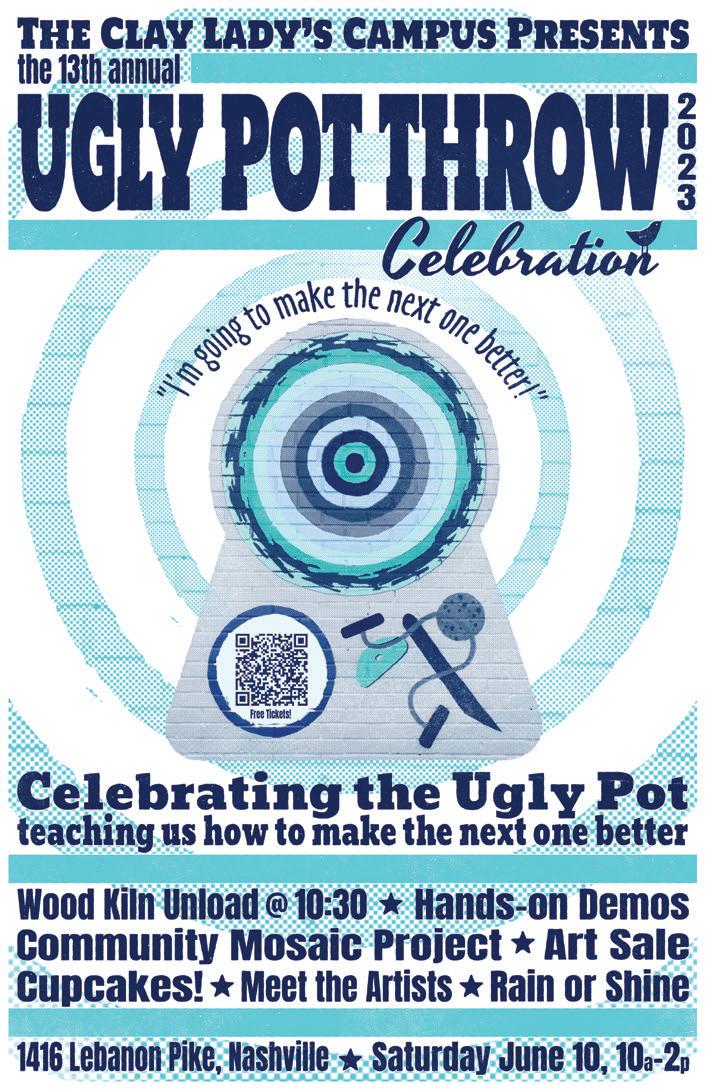
SATURDAY, JUNE 3
SATURDAY STORYTIME
CELEBRATING PRIDE with PARNASSUS STAFF
6:30PM
TUESDAY, JUNE 6
CIDNY BULLENS at PARNASSUS TransElectric: My Life as a Cosmic Rock Star
THURSDAY, JUNE 8
Joe Walsh and John Oates, rising stars Chapel Hart and many others. June 6-7

STEPHEN TRAGESER

Fifteen years ago, hundreds of children gathered every day to see John Early live at 2000 Edgehill Ave. Parents paid $10,000 a year back then for their kids to be part of Early’s captive audience at University School of Nashville, where today’s consummate live entertainer honed his chops as a quintuple threat (singing,
Well, we’ve reached a chapter in the dystopian playbook where we’re facing a banned-book movement. It’s bonkers. I can’t begin to comprehend why the bans are happening, so let’s turn to music. Art is the antidote to numbness after all. The Next Chapter Society is hosting an evening of live music and cocktails to support Nashville Public Library’s commitment to the freedom to read. Performers include Honduran musician Gustavo Moradel, country duo Lazy Jane, multi-
1416 LEBANON PIKE, NASHVILLE, TN 37210 615.242.0300
6:30PM
M HENDRIX at PARNASSUS The Chaperone
6:30PM
WEDNESDAY, JUNE 14
RACHEL LOUISE MARTIN at PARNASSUS A Most Tolerant Little Town
6:30PM
ELI MERRITT
THURSDAY, JUNE 15
with NICK ZEPPOS at PARNASSUS Disunion Among Ourselves
3900 Hillsboro Pike Suite 14 | Nashville, TN 37215 (615) 953-2243



Shop online at parnassusbooks.net
@parnassusbooks1 @parnassusbooks @parnassusbooks1 Parnassus Books


dancing, acting, flirting, successfully landing jokes at times both appropriate and inappropriate). Early left Nashville for New York, where he has evolved into one of the era’s most desirable class clowns, earning spots in movies and TV shows (Search Party, The Afterparty, I Think You Should Leave and many more) and officiating at least one celebrity wedding. Soon he will host his own HBO standup special, a golden ticket for any streaming-era comedian. Thanks in part to a hilariously desperate Twitter post last week, the second leg of Early’s tour is selling out quickly. Catch him being funny on a stage June 6 at City Winery. 7 p.m. at City Winery, 609 Lafayette St. ELI MOTYCKA
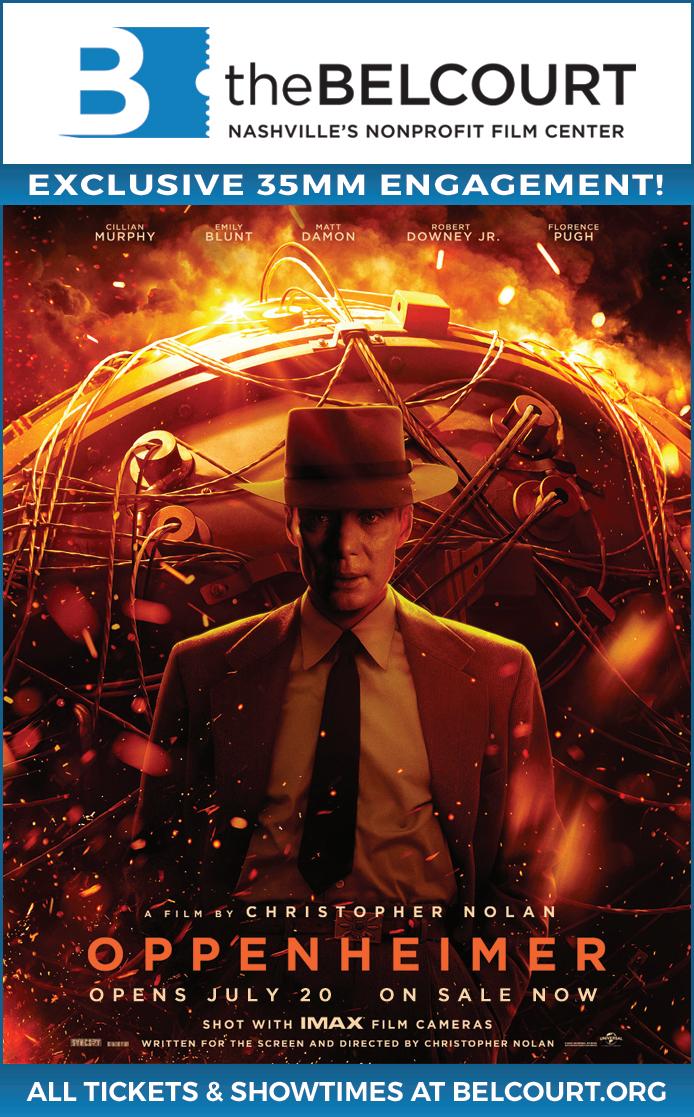
By any measure, singer-songwriter Cidny Bullens has lived an extraordinary life — touring with Sir Elton John, performing with Bob Dylan and even earning a Grammy nomination for lead vocals on the soundtrack to the 1978 blockbuster film Grease. But as is so often the case, some of his life’s most defining moments have taken place behind the scenes, as Cid (formerly known as Cindy) navigated “the drug-fueled excesses of 1970s rock ’n’ roll,” suburban motherhood, the unspeakable loss of a child, and finally, the decision to transition — publicly coming out as a transgender man in 2012. Bullens captures it all in his engaging new memoir, TransElectric: My Life as a Cosmic Rock Star. It’s a beautifully told story of courage, perseverance and authenticity, and he’ll be doing a public reading at Parnassus Books. The event is free, but registration is required. 6:30 p.m. at Parnassus Books, 3900 Hillsboro Pike
instrumentalist Korby Lenker and more. There’s a suggested donation of $15, and all proceeds go toward the library’s literacy programs and efforts to make Nashville a more equitable city. Let’s have all hands on deck, ’cause this chapter ain’t over yet. 6 p.m. at Love and Exile, 715 Main St. TOBY ROSE
[THAT DO IMPRESS ME MUCH]

By most counts, the Canadian artist born Eileen Regina Edwards — better known to pop and country fans the world over as Shania Twain — has sold a staggering 100 million albums. Only Taylor Swift has spent more weeks at No. 1 on Billboard’s Top Country Albums chart, and Twain’s juggernaut of a breakthrough record, 1997’s Come On Over, is the bestselling album by a solo female performer in history. All this is just to say — in case it isn’t exceedingly obvious — Shania Twain is a force of nature. Produced by Twain’s then-husband, South African mega-producer Mutt Lange, Come On Over is a record stuffed with banger after banger, about half of which tend to show up in Twain’s set lists as of late. Attendees at this show — the inaugural concert at Nashville SC’s shimmering new Geodis Park — can also expect tunes from the country star’s latest, Queen of Me, as well as outsized production elements, a world-class touring band, and opening sets from fellow country-popsters Kelsea Ballerini and Breland. 6:30 p.m. at Geodis Park, 501 Benton Ave. D. PATRICK RODGERS















Date Night is a multipart road map for everyone who wants a nice evening out, but has no time to plan it. It’s for people who want to do more than just go to one restaurant and call it a night. It’s for overwhelmed parents who don’t get out often; for friends who visit the same three restaurants because they’re too afraid to try someplace new; and for busy folks who keep forgetting all the places they’ve driven past, heard about, seen on social and said, “Let’s remember that place next time we go out.”
All I know about Ladie Savage Butts is that she was born in 1882 and died in 1957. I don’t know how she lived and died or whether she took her biscuits with butter or jam — only that she gets my vote for Most Interesting Headstone in the Nashville City Cemetery, where my husband Dom and I started our recent date night.
It is absolutely gorgeous there, friends. And it’s hiding in plain sight, just a couple blocks south of where the Second and Fourth avenues exit dumps you off of I-40 East. In this random, industrial-ish area, Nashville’s oldest continuously operated public cemetery is a well-preserved pocket of tree-lined walkways, weathered statues and iron gates that creeaak open to the final resting place of Civil War veterans, former Nashville mayors, enslaved people and Nashville’s founding families.
It’s blessedly empty, even at sundown when the heat finally relents and the light’s just right. I spied a total of three people in the distance as we strolled from one end to the other, and crossed paths with exactly no one.
It’s also impossibly quiet. Only two sounds broke the silence during our visit: the Nashville City Cemetery tour app, which offered historical facts as we passed various markers, and the occasional woo bus.
As I approached sweet Ladie Savage Butts’ headstone to get a closer look, one rolled by thumping out “Drop It Like It’s Hot” with a gaggle of bachelorettes doing just that. Gotta say, I’m still trying to wrap my head around that bizarro collision of O.G. Nashville and modern times.
From either of the cemetery exits, both of which face Fourth Avenue South, Dicey’s Pizza & Tavern is an easy eight-minute walk

around the corner and over the train tracks in the Wedgewood-Houston neighborhood. Dicey’s is a super casual spot with solid service. It’s a lot bigger than it looks from the outside, with space in the bar, main room, outdoor covered deck and back patio for all the double dates, tables of dudes, bachelorette parties, people who take their dogs to dinner and families young and old to be together, but not on top of each other.
When we arrived at 6 p.m. on a Friday night, the main area was full, and we shared the crispy cheese over a picnic table. Besides the shape, what makes these two fried pockets of mozzarella different from every other mozzarella stick in America? A layer of basil lemon pesto that gives each bite a nice, herby hit.
I want to throw my full support behind any kitchen creative enough to use salt-andpepper potato chips instead of croutons on a salad, so I ordered the Little Gem with roasted cauliflower and creamy lemonanchovy dressing. With all of those ingredients, it should have been a 10/10 in terms of textures and flavors, but it was strangely one-note. I kept eating it, thinking there might be something wrong with me rather than the salad. Then a toddler threw a ping pong ball into it, and his mother, after many apologies, remarked offhandedly, “Make sure to squeeze the lemon all over that salad. I love it, but last time I had it they were off on their dressing.” We had much better luck with the Chopped Greek.
Dicey’s hangs their hat on thin-crust, pub-cut pizzas dusted with semolina flour on the bottom, which gives it a nice grit. They do some fun combos, like hot-pickle-baconcheddar, sausage-and-giardiniera, and cacio e pepe, in addition to the classics (cheese, pepperoni, sausage, veggie) and createyour-own. I like the slight funk that taleggio cheese gives the Hippy Flip (roasted mushrooms, lemon, green onion) and the
restrained heat of the Earth Crisis, but it could’ve used some cheese to keep all the cubes of roasted eggplant and onion from diving to their death on my plate.




I have a huge soft spot for Dicey’s: Their branding, from the menu to the plates, red plastic tumblers and pizza boxes, reminds me of the old-school pizza parlors and redsauce joints I visited with my Grandma Antrilli in Pittsburgh as a kid. So I say this with love: Most of the food we had on two visits was oversalted, from the fried pickles to the $1 side of ranch. What I initially thought was a chunk of shaved Parmesan in the cracks and crevices of my Earth Crisis was a big clump of flaky salt.
This is an easy fix, and should stop exactly no one from trying it out or going back.
A couple options when you leave Dicey’s: If you’re over the eating and drinking, as I often am, walk just across the train tracks on your right to the grassy area in front of Live Nation, hop on a swing and sit in the glow of the guitar-shaped scoreboard devel-

opers bought from Greer Stadium when the Nashville Sounds left for greener fields. Or make three lefts: one out the door of Dicey’s onto Chestnut, another at the crosswalk at Martin and one more on Houston, the second half of the neighborhood’s namesake.

You could stop for a drink at Earnest Bar & Hideaway — instead of listing out ingredients on the cocktail menu they make up a fun story about each. You could duck into Jackalope or Bastion. Or keep going until you can’t go anymore, where Houston deadends into the train tracks and you’ve arrived at Never Never.



Never Never has no theme. It barely has decor. That’s what makes it great. Half the space is a traditional indoor bar setup; the other half is an outdoor bar and patio. They have a short list of cocktails, a slightly longer list of beers, and chunky chili or chili nachos, beef or veg style. This is not a place to see and be seen; it’s a place to sit and be with your people. The best bars don’t beat you over the head with who they are; they’re a shell for whatever you need them to be.
EMAIL EDITOR@NASHVILLESCENE.COM












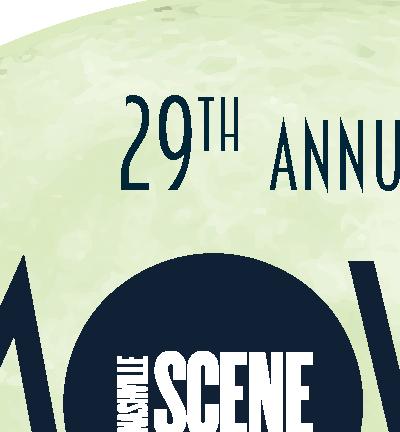


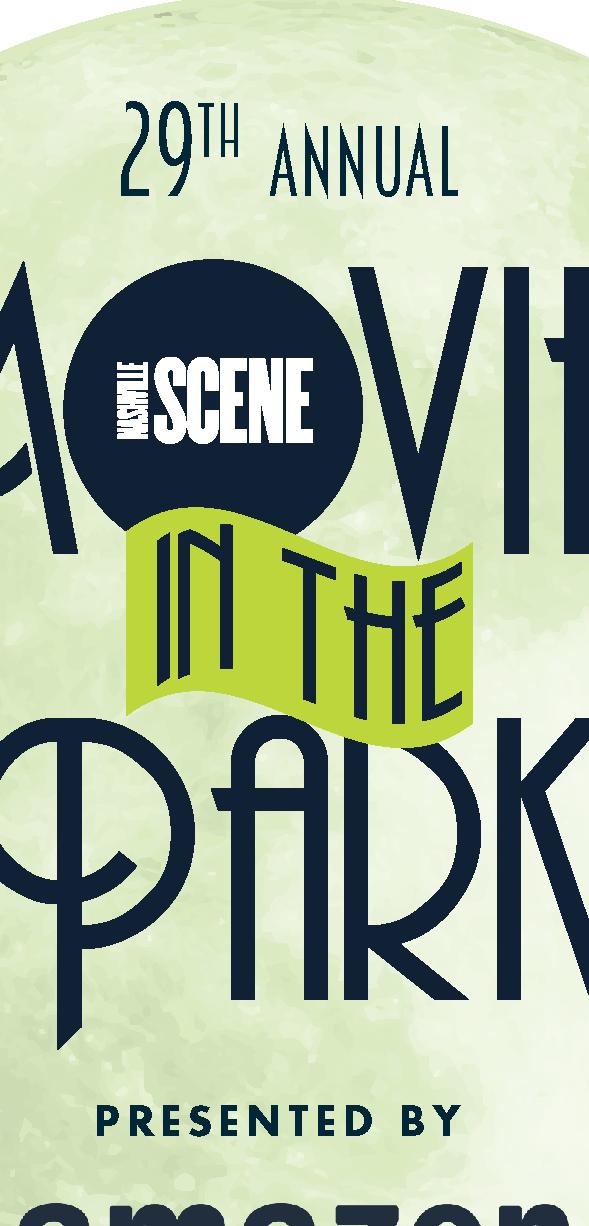







































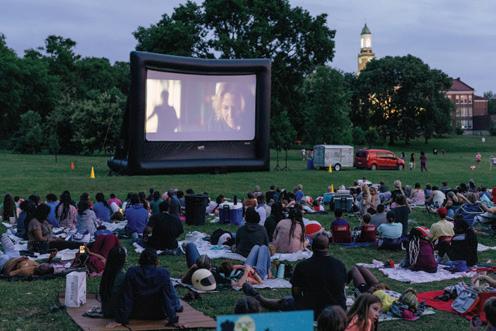
















 BY JOE NOLAN
BY JOE NOLAN

It’s not summer yet, but all the shows opening this Saturday night will run through the official beginning of the hot weather season on June 21. And by the time you read this, kids all over the city will have already been out of school for a week. We’re gonna go ahead and call these new exhibitions the first shows of the summer, using the logic we learned from the classic summertime film Caddyshack: “We can do that. We don’t even need a reason.”
WEDGEWOOD-HOUSTON
Karen Seapker’s new painting exhibition, Green’s Your Color, made for one of the most striking debuts at May’s First Saturday happenings in Wedgewood-Houston. (Read Laura Hutson Hunter’s review of the show in our May 25 issue.) It’s also a great example of why I’m constantly praising Zeitgeist’s longish exhibition schedules. This is a big exhibit, but also a show packed with little details, and it’s definitely a display that rewards multiple viewings. The work is inspired by the backyard garden that Seapker can gaze at from her home studio in Donelson. My favorite home design trend is blurring the line between exteriors and interiors — bringing the outside in. Seapker’s new series is bursting with garden greens and forms that resemble seeds, leaves, stems and even gardener’s hands. She manages to be perfectly on time with current tastes without sacrificing the pastel palettes and abstracted figures and forms that have become her signature. My favorite works in the show pair small wooden platforms with large, low-hanging paintings — the arrangements read like altars to nature, natural beauty and abundance. Some of the platforms are themselves decorated with small objects, bringing a sculptural sensibility to the show. Seapker’s woodwork is as precise as her painting, and these new painterly installation works represent an intriguing step forward for the artist and her practice.
Crawlers might know Ryan Rado as the curator of the Rockwall Gallery in Houston Station. Rado is also an artist in his own right, and his latest solo exhibition is an exploration of the city of Detroit and Rado’s off-andon relationship with his late father. Rado grew up in the Motor City, and it’s the place the artist always returned to when he had opportunities to visit his dad. The contradictions of the storied and sordid city of Detroit have inspired countless creatives — like the late great Marvin Gaye, who said, “Detroit turned out to be heaven, but it also turned out to be hell.” (If you think it sounds impossible to love and loathe at the same time, just gaze into the troubled stare of any longtime Lions football fan.) I also grew up in Detroit, and I appreciate the way Rado brings both
the grandeur and grit of the city into his work by utilizing unexpected materials, like the velvet surfaces he drenches with gooey oozes of acrylic paint and punishes with heavy-handed mark-making. Detroit Was Always a Mystery to Me is co-presented by The Forge and Risology Club, and curated by The Forge’s Alyssa Beach. The show opens at Rockwall Saturday night. Afterward, we’re going to order some Buddy’s pizza, pick up some Faygo pop at the party store, play euchre and listen to Mitch Ryder records until the cows come home.
I love an exciting new solo show as much as the next art gallery rat, but there’s something charming about the group shows that art venues program during warm-weather months between the banging art-gawking seasons of spring and fall. It’s often just a neat trick to expose a broad roster of artists to potential walk-in customers, but sometimes these diverse displays are greater than the sum of their parts. Case in point: Nashville Hot Summer at Red Arrow. Maybe I’m just a sucker for the scorching title, but this display of smaller works by nearly a dozen artists is one of my must-see shows opening this weekend. The exhibition includes paintings, drawings and sculptures by a choice selection of gallery faves, including Julian Rogers, Calli Moore and Aaron Worley. It also marks the Red Arrow debut for local visionary Benji Anderson, whose The Fitful Portal show at Elephant Gallery in 2022 won my Best of Nashville Writer’s Choice for Best Solo Gallery Exhibition.
The Downtown Presbyterian Church’s artists-in-residence have done an outstanding job of bringing The Browsing Room gallery space back to life after it was shut down during the pandemic. The programming of the gallery varies as much as the personalities of the artists who curate it, but there’s always an emphasis on experimentation inside their rather generous white cube of a display space. In June, the DPC artists will be debuting their own new works in The Browsing Room, but they couldn’t resist the opportunity to gamify the curatorial side of the project and learn a thing or two about democracy and good taste along the way. A Different Town Hall: Artists in Residence at DPC started with the idea that none of the artists would choose which of their own works to show in the exhibition. They decided that each artist’s work would instead be picked by their studio mates, the other artists-in-residence in the church’s iconic creative spaces. This led to the establishment of a democratic process including popular voting, majority rule and even one dissenter. One of their biggest challenges was trying to pick strong works that represented these artists’ individual practices, but that also fit together into a cohesive exhibition. The Browsing Room’s self-deprecating press release describes the results of their democratic experiment as “a versatile selection from a hung jury.” The show includes paintings, pen-and-ink drawings, sculpture and textiles created — and curated — by Richard Feaster, Hans SchmittMatzen, Rolin Smith, Sarah Hart Landolt, Mel Beall, Dana Jo Cooley and Janet Decker
Yanez

 BY JACQUELINE ZEISLOFT
Why Tammy Wynette Matters ventures
BY JACQUELINE ZEISLOFT
Why Tammy Wynette Matters ventures





















beyond the usual narrative of Tammy Wynette as a tragic country star whose numerous marriages and early death have often defined her. In this slim yet rich book of criticism, part of the Music Matters series from University of Texas Press, Steacy Easton considers the singer’s “ambitious, transparent and haunted work” in a feminist context, drawing out Wynette’s artistry and paying respect to her impact on country music.
Country legends have a tendency to couple up. Wynette married George Jones. Tim McGraw married Faith Hill. June Carter and Johnny Cash’s love is legendary. These country couples represent something traditionally endemic to their genre and its many straight, God-loving fans: that marriage is a moral high ground, and it comes with distinct gender roles.



In country music, men are outlaws, breadwinners and party animals. Women are sensitive, loving and domestic. Wynette’s persona embodies that type of womanhood. Easton is nonbinary, and they credit their personal distance from heteronormative domesticity as the root of their fascination with Wynette’s relationship to it: “Country music’s consideration of the domestic is done in the context of an audience of people who belong to it, and so those who are outside its sphere are not allowed to be external critics of it.” Easton’s removal from the domestic brings this outsider perspective to the forefront. What we may take for granted about Wynette’s songs about “women at home” becomes a grounding focal point for Easton’s criticism.
Traditional femininity and preserving the domestic dream were core to Wynette’s persona. As a Southern woman from small-town Mississippi, she followed the well-etched path and married when she was 17. In her pre-fame years, she worked as a hairdresser — an archetypal “femme” occupation. She had three daughters, and would have a fourth daughter in her marriage to George Jones. She kept entering into marriage despite being with abusive men; she married five times.
History stops there in the story of Wynette’s life — the humble roots and five husbands are what we get. What makes Why Tammy Wynette Matters exceptional is that it considers how those experiences gave her work its power. “The dramatic irony of making great art about domestic roles while failing in them is central to understanding why she matters,” writes Easton. Wynette’s best songs — like “D-I-V-O-R-C-E,” “Apartment
No. 9” and “I Don’t Want to Play House” — depict lonely domestic scenes of women reflecting on crumbling marriages or their husbands’ extramarital affairs.


Easton argues that Wynette’s lived experiences make her performances of these songs transcendent. Even an untrained ear can detect her “well for sadness” on “Stand by Your Man,” probably her best-known song. Easton’s reading of “Stand by Your Man” offers many layers. Wynette took hits from second-wave feminists over the song for promoting submissive ideals of marriage, and she performed it at a political rally for George Wallace — the massively racist longtime governor of Alabama. Easton reveals the not-so-flattering anecdotes and deeper truths about why “Stand by Your Man” matters.
Despite her relatability, Wynette was not your average woman or wife. Her rigorous tour schedule and the 33 albums she recorded are evidence of that. She asked for divorces. She made the money. So why did she perform domesticity and gender roles with fervor? Easton wonders whether Wynette’s attachment to her persona as a wife was due to feeling confined by the role, yet not seeing a way out: “One of the central themes of Wynette’s career was how ‘it’s hard to be a woman,’ and by extension it’s hard to avoid the traps that exist in performing womanhood.” One trap was the way the music industry perceived her. Critics and Music Row serially downplayed her role in her own art. Because Wynette didn’t write her songs, they would credit others (men) with the significance of her work.
Easton understands Wynette’s performance of gender as a “fracturing of the self.” Wynette held onto her domestic image, but at the same time she was a bona fide star. “This move between diva and mother, between arch performer and ordinary domestic, was the dialectic that marked Wynette’s life,” writes Easton. She had immense talent — it’s hard to find the words to explain the cutting power of her voice. What should also be remembered is the way she navigated two spheres — the public and the private — and the dimensions this brought to her music.
Easton acknowledges that Wynette is underplayed today, writing that Wynette’s “skills and talents have slipped under public consciousness.” Luckily the author is here to revive her memory and give her work the critical reading it deserves. Easton is “deeply committed to Wynette as a performer and writer.” They approach their subject with curiosity, generosity and love. Loving Wynette feels important when writing about her. Real love celebrates nuance. When studying Wynette, nuance feels like the necessary treatment.
For more local book coverage, please visit Chapter16.org, an online publication of Humanities Tennessee.




EMAILS ARTS@NASHVILLESCENE.COM

























Why Tammy Wynette Matters places the singer’s work in a feminist context

What one small appliance taught me about self-acceptance

 BY MARY LIZA HARTONG
BY MARY LIZA HARTONG
Vodka Yonic features a rotating cast of women and nonbinary writers from around the world sharing stories that are alternately humorous, sobering, intellectual, erotic, religious or painfully personal. You never know what you’ll find in this column, but we hope this potent mix of stories encourages conversation.




My fiancée loses her phone at least twice a day. She often lodges socks so far beneath the couch that they require a Saint Bernard to rescue them. And recently, when we were watching TV in bed, she opened a packet of Starkist tuna and laid the lip of the dripping wet package between us, as if this were a perfectly normal thing to do.

“Bridget!” I shrieked.







“What?”




Despite her affinity for messes, she reminds me of the Dustbuster. There is nothing more satisfying to me than the Dustbuster. It’s only about the size of a loaf of bread, but oh, the satisfaction it brings. The little pockets of beauty it creates where there once was a ball of hair or a crumbled cookie or a dead stink bug. The Dustbuster is humble, despite its power to say, “Ta-da!” It provides instant comfort, reminding me that things aren’t so bad, that the house isn’t all that dirty, and that my life, however disordered, is but one good whoosh away from relief.
I once lived in a house that I could never get clean. The toilet rusted up immediately after scrubbing. The corners of the rooms were like flypaper, collecting cough-drop wrappers and spiderwebs. Earrings were forever falling into the cracks between the floorboards, which heaved gusts of dust with every step like they were exasperated with me. It did not help that the woman I was dating told me I cleaned things wrong. She was a perfectionist. She liked the dishwasher loaded a certain way and the food cooked exactly as written in the recipe book.

“Are these dishes dirty or clean?” I asked her once.
The plates gleamed in their racks, but I could just make out the coffee faintly staining the cups. The spoons contained no trace of peanut butter, but the knives held hints of breakfast in their tiny teeth.

“They’re dirty,” she said, like it was obvious.

“But why do they look so clean?”
“That’s how they should always look when they go in the dishwasher,” she said. “That’s how they look when you rinse them first.”
I got the Dustbuster a few months ago because the regular-size vacuum was starting to make me feel like the old girlfriend did — like I couldn’t do anything right. Bulky and blue, it sat in the hall closet, practically crossing its arms every time I opened the





door and didn’t choose to pull it out. What can I say? It was heavy. The rest of the closet teemed with precariously stacked boxes, a shovel, a metal detector and a bin of jewelry-making supplies. It was a shrine to activities I could be doing but wasn’t. To open this closet wasn’t just to see the unused vacuum, but to behold the unrealized dream of starting a garden or soldering a necklace.
The Dustbuster, on the other hand, brightens when I enter the room. We demolish dust bunnies and revel in the crackle of another popcorn kernel expertly busted. Putzing around the house, from corner to corner and from excavated sock to excavated sock, I feel a lightness of being. The house is far from spotless — it is all but impossible to vacuum an entire house with the Dustbuster — but that’s kind of the point. I will never be the sort of person who dutifully rinses dishes before placing them into the dishwasher, but when I met Bridget, I finally realized I didn’t have to be.
When our bed isn’t drenched in tuna juice, it’s actually pretty cute. In the morning, after she kisses me goodbye but before I start writing, I take my time making it. Fold, tuck, arrange. This is no small task, what with the 13 pillows, three blankets and the gaggle of plush avocados and stuffed cats who gather there. A few weeks ago I forgot to make it. It might have been a doctor’s appointment or a meeting or, quite possibly, my creativity dragging me directly to the desk. Either way, the avocados remained on the floor.
“Sorry for not making the bed,” I told Bridget when she came home that night.
“It’s OK,” she said simply, “I didn’t make it either.”

We brushed our teeth and slipped into our pajamas, deciding on a show to watch. Something about British people throwing pottery or couples deciding which house to renovate. Downstairs, in the slightly swept kitchen, with the good-enough microwave and the seldom-wiped counter, the dishes lay perfectly stained in the sink.
EMAIL ARTS@NASHVILLESCENE.COM





Ultra w/ Gloom Girl MFG, Lombardy (9pm)
Parrish w/ Emma Ogier (7pm) Beau Burnette, Blonde Bones, Spirit Week (9pm) Cinema Stereo, Mason Pace, The Garden Of Eden (7pm) Adam Mac, Nell Maynard, Chris Housman, Elizabeth Davis, Zoe Cummins, Ahli (9pm)


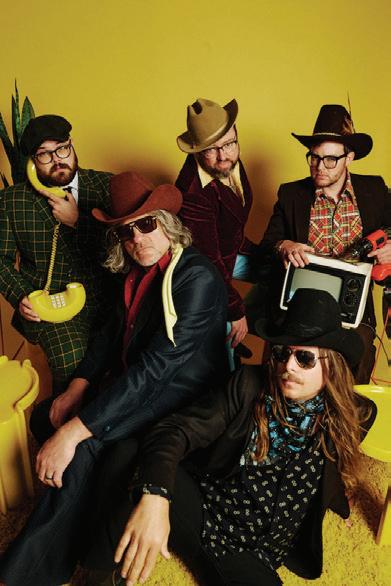


Gaskin (6pm) Collin Nash w/ Jack McKeon (7pm)
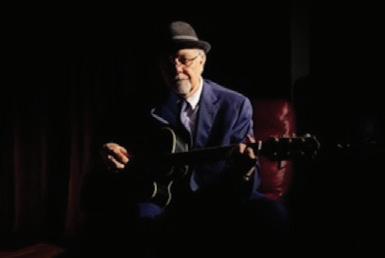

Ellisa Sun, Evan Doan Jenkins, Eva Cassel (9pm)
V3RN w/ Jack The Underdog (7pm)

Pylon Reenactment Society w/ Palomina and Thayer Sarrano (8pm)



Sam Barber (7pm)
Natasha Blaine, Window Weather, Jenny Rae (9pm)





The Ries Brothers, KNEX, Matt Daughtry (7pm)



Mary Heather Hickman, Stefanie Joyce (9:30pm)
Ben Chapman w/ See Creature, Ricky Young (of The Wild Feathers), Tyler Halverson (7:30pm)




Good Looks (7pm)
Skylar Gregg, Stephie

WMOT Roots Radio Presents

THE KODY NORRIS SHOW - Album Release 7:30 Duke Spirits Presents Master Series w/ ERIC PASLAY, THOMPSON SQUARE, PAUL MCDONALD w/ THE DRYES, SIX ONE FIVE COLLECTIVE and ANNIE BOSKO

LANG featuring MOE BANDY, JON CONLEE, WADE HAYES, TERRY MCBRIDE, BRANDON DAVIS, ELIZABETH COOK & More!
Bully is Alicia Bognanno.
Though the project has always had her at the center, the singer, songwriter, guitarist, producer and engineer worked with collaborators as official band members through most of the 2010s. Following a slew of life changes, Bognanno became the sole member and took full control of Bully for the first time as she made her third album, 2020’s Sugaregg. She still frequently works with other musicians in the studio and on tour, but she is the sole creative mind behind the music. Bognanno says this evolution freed her from self-doubt about the creative process.

“When I’m in the room with other people, my inner dialogue is like, ‘You’re gonna think that’s stupid,’” she says. “[Now I’m] able to just kind of play the role of, like, ‘It’s fine, you don’t have to hide behind anything. You can just do what you want and not have to worry about what has been.’ … I kind of thrive when I’m alone.”
Bognanno’s uninhibited command is evident on her newest Bully record Lucky for
You, out Friday via Sub Pop. The album is thematically heavy — unsurprising to those familiar with Bully’s discography — but the subject matter covers something entirely new. Much of the record deals with the death of Bognanno’s dog Mezzi, who died in March 2022. Bully’s music has always been honest, but this is Bognanno at her most earnest. Even the title rings with sincerity, despite its layered meanings.
“That title came from … that moment of realizing how lucky I was to have Mezzi, and how much she truly elevated my life,” says Bognanno. “I would go through the pain all over again times 20, just to have two more minutes with her, for sure. But I think just realizing [my relationship with Mezzi] wasn’t owed to me — that was a gift that I was able to receive.”
All of Lucky for You stings with the stale yellowish haze of grief. Bognanno has a lot to grieve, as it seems most of us do. She entered the pandemic lockdown in 2020 newly sober. While she says that choice has helped her manage chronic health conditions and grow in important ways, it was a massive challenge. As the world slowly burned, she realized that the support mechanisms she relied on were gone.
“When I was drinking, a lot of it was to cope in social situations,” she says. “I would get really anxious and uncomfortable, and that was kind of my way of getting through it, and making friends, and being like, ‘Look, I’m not socially awkward. I’m so fun.’ It was
like, ‘No, but you’re crazy right now.’ But yeah, I think that that is just another particularly strange thing about that is having to navigate [sobriety] in a city where you’ve been in so long, and my house in particular — and just driving past all those old places that kind of, like, give you the chills a little bit, and remind you of not-great moments.”
Lucky for You also tackles the collective grief compounded by the attack on LGBTQ communities and women’s rights in the United States over the past year, especially in the South. For Bognanno and many others, these rulings were personal. On Lucky for You’s penultimate track “Ms. America,” Bognanno sings: “All I wanted was a daughter / Try my best to raise her right / But the whole world’s caught on fire / And I don’t wanna teach a kid to fight.” Bognanno says the feelings she experienced as these changes rolled out mirrored the doubts she felt working in previous iterations of Bully.
“I just felt like, over that time period, there were so many different emotions I was thinking about while that was all happening,” she says. “I feel like I’ve fought a lot to have myself taken seriously and to get over impostor syndrome — which I’m not, but I’m a lot better — and find my own confidence. And that just felt like such a slap in the face, like, ‘Am I even taken seriously as a woman?’ It was baffling to me. Especially as somebody who has benefited from having an abortion, and I know that’s like a controversial thing to talk about.
“But I think it’s way more common than
not — 1 in 4 women experience that. You don’t know people’s circumstances. And living in a place where there isn’t enough support, or child care, or people trying to, you know, get by, it’s just like, I felt so like, ‘How can you not see the effect that this can have on people?’ … This feels like a universal thing that we should agree on, because this is something that can benefit everybody regardless of their views. And the idea of choice and thinking about, ‘OK, if you’re not in line with it, don’t do it.’ But how dare you think you can make that choice for somebody else.”
Bognanno headed out for a run of solo dates in Europe in May, before health issues unfortunately cut the tour short. But she recently opened for The Breeders in Nashville and will support the Pixies on a summer tour — both bands who are fundamental to her musical background — before returning to headline Brooklyn Bowl on Aug. 31. Upcoming Bully shows will also be on a scale beyond anything fans have seen before, with each touring musician working double- and triple-time to bring the explosive new record to life. Even more so than her previous works, Bognanno’s writing and instrumentation on Lucky for You echoes the best of the ’90s, but not just grunge: Britpop, dream pop, shoegaze and feminist punk influences create the best and brightest Bully sound to date. Hope somehow shines through all the grief, assuring that the new songs will bring a new level of catharsis.
EMAIL MUSIC@NASHVILLESCENE.COM









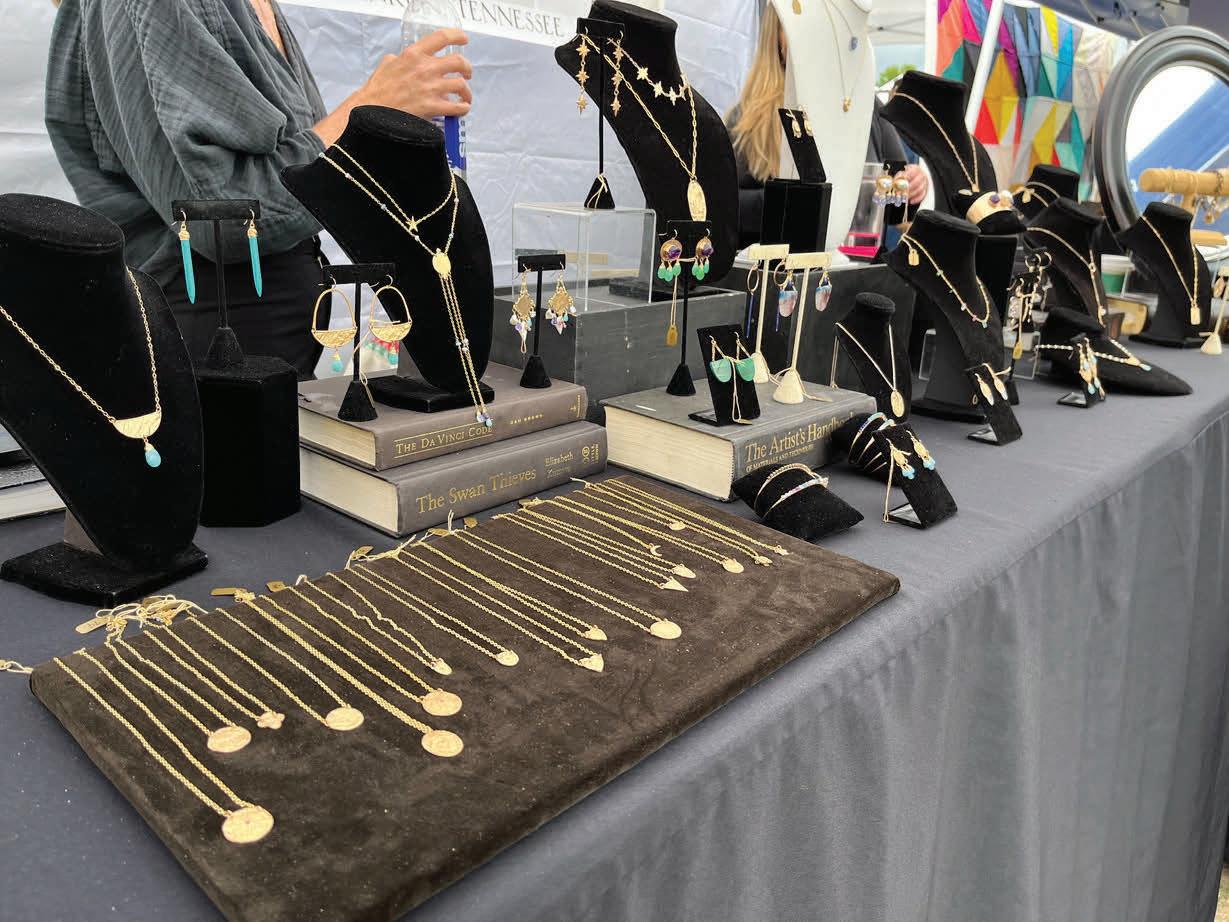





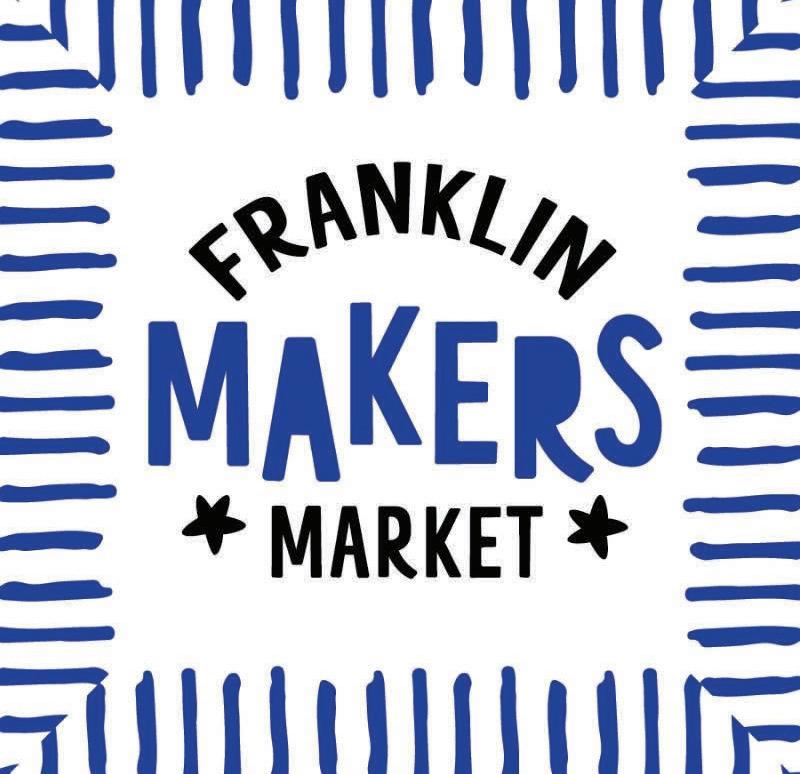









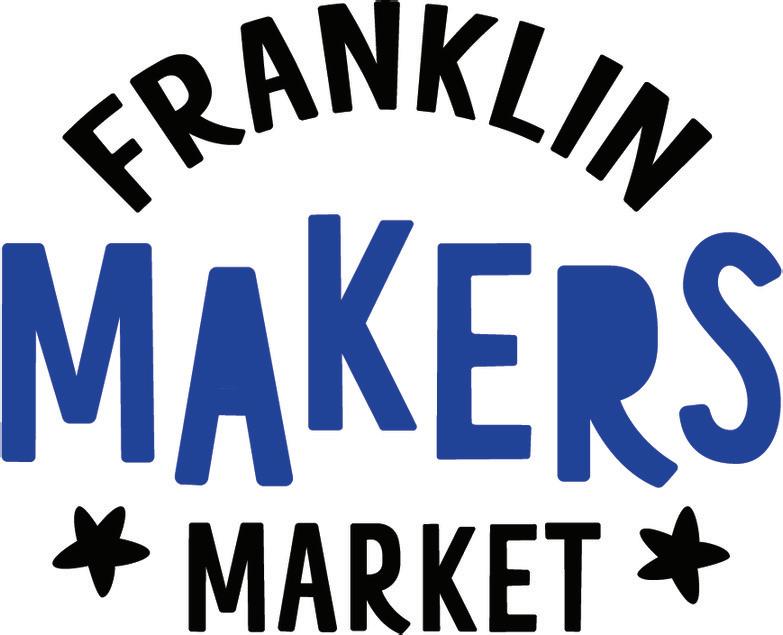





































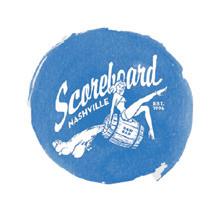












For those of us brought up in the world of Southern evangelical Christianity, the themes and imagery of The Starling Girl are familiar ones. Obsession over purity. Sexuality as a deeply shameful element of humanity, meant only for marital procreation. Being “mindful” — allowing one’s thoughts to dwell only on holy things. Purity rings, courtship, baptism, fellowship meals,
THE LITTLE MERMAID IN THEATERS
The Little Mermaid is more enjoyable than Disney’s “live action” Lion King remake — due to having actual human and humanoid characters to break the weird uncanny valley of nonstop CGI animals, as well as a vibe that does read more fairy tale than baroque nature documentary. This is a collection of different emotional responses that aims to keep grandeur and accessibility in a weird balancing act. It doesn’t replace its 1989 animated precursor (there’s simply no way it could), but it accompanies it, engaging in a dialogue about how our perceptions of classic fairy tales evolve over time. The 1989 version was also a very different animal from the original Hans Christian Andersen story, so there’s a history for changing perspectives. Halle Bailey as Ariel is a superb choice, with an expressive voice and a commitment to the role, and Melissa McCarthy as Ursula puts her ankles into it, showing proper respect to both Pat Carroll’s original take on the character and the late Divine’s inspiration of the character. (Though if you’ve seen Ts Madison’s version of “Poor Unfortunate Souls” online or Lizzo’s audition tape, you are certainly allowed to trip out on those possibilities,
praise and worship.
For the uninitiated, however, the Southern evangelical Christianity depicted in The Starling Girl — specifically, Southern Christian fundamentalism — will look like a peculiar thing, perhaps even exaggerated or anachronistic. Indeed, until you catch a glimpse of one character’s smartphone, you might think the film is set decades in the past. But the world of The Starling Girl — misogynistic, repressed and emotionally twisted as it is — very much exists here in the 21st century.
Set in a fundamentalist Christian com-
because all three women do impeccable work.) There’s some disconnect between the human performers and the “realistic” CG critters with human voices. (Flounder in this film is kind of off-putting from a design perspective.) Also, seagulls can’t breathe underwater (though whoever recognized that Awkwafina kind of is the Buddy Hackett of the 2020s deserves a raise of some sort). And if we’re addressing the big issues, Jonah Hauer-King’s Prince Eric doesn’t get to make that much of an impression. And there’s the whole fact that these live-action remakes are a means of extending copyright and also screwing over the initial screenwriters. But considering what a mess the 2019 Lion King shook out as, this is a pleasant enough and strange endeavor. Excising “Les Poissons,” however, is some bullshit.
Blessed with an abundance of primary-source footage shot by icon/disco diva/cautionary tale/ former Nashvillian Donna Summer, this documentary is revelatory and unconventional. Even when the audio is in talking-head structuralist mode, we’re seeing so much that is new (to us), giving us ongoing contexts in the life of a performer who approached every song as an actress, creating new points of reference with each chorus and not letting us see any further. Summer’s daughter Brooklyn Sudano is co-director, and we are able to see so many of these moments in which Donna Summer was simply allowed to be, and it’s never less than fascinating. Yes, Love to Love You, Donna Summer addresses the controversy that ultimately crippled her career with the queer community (and honestly
munity in small-town Kentucky, The Starling Girl is the debut feature from writer-director Laurel Parmet. It’s also a showcase for some largely undersung talent. Viewers may recognize Eliza Scanlan (our lead, Jem Starling) from Little Women and HBO’s Sharp Objects, or Jimmi Simpson (her father Paul) from Westworld, or from his role as It’s Always Sunny in Philadelphia fan favorite Liam McPoyle. You might even recognize Wrenn Schmidt (Jem’s mother Heidi) if you’re a fan of Apple TV+’s For All Mankind. But by and large, these are very strong performers who, despite consistent work, haven’t gotten their due. And aside from the fact that they’re all uncommonly good-looking with toned physiques and cool hair, they’re very believable as a close-knit family of deeply repressed Bible-thumpers in rural Kentucky.
Jem is 17 and pious, plagued by both hormonal stirrings and a tremendous sense of shame. She’s in the church’s dance troupe (a pretty unthinkable form of worship for those of us from a Church of Christ background) and helps her mother with the housework and tending to her younger siblings. Of course, everyone has their vices. Mom slyly pops pills; Dad secretly swigs booze out in the garage while pining for his days as a secular musician. Into the mix comes late-20s youth pastor Owen (Bill Pullman’s son Lewis, also good-looking with great hair), a smoldering missionary who arrives with a troubled marriage and unorthodox ideas about spirituality.
The odd irony of sexual repression is just how much it turns everything sexual. When lust is a sin, every forbidden glance, every step in the slow, delicate dance of flirtation is that much more powerful and dangerous.
could have gone further with it — The 700 Club would show Summer off like a trophy during her later years), and no, there’s not enough Giorgio Moroder and Pete Bellotte. (Summer co-wrote all of her 1975-1980 hits with them.) But anyone looking to the legacy of Donna Summer and the possibilities of what disco could become should watch this immediately.
Every year, there are a lot of film festival finds that never make it past that stage, living in the ephemeral spaces of viewers who just happened to catch something at the right time. The MVP of the 2020 Chattanooga Film Festival, The Yellow Night is an exquisite Brazilian nightmare that vibes like a collision between April Fool’s Day and Last Year at Marienbad — taking a bunch of city teens to a remote island family estate where scientific experimentation and preternatural geography have unlocked … something. Perhaps it’s the vibe of those early pandemic days of porous cosmic boundaries, or maybe just the weird shifts in the way this story unfolds, but this is one of the great horror films of the decade. (Four words: abandoned water park timeslip.) Director/co-writer Ramon Porto Mota is one to keep an eye on, equally versed in unspeakable scientific schisms and what the Pet Shop Boys called total teenage destruction. Someone at Tubi is doing The Work in making sure this film is seeable.
MALUM NOW AVAILABLE VIA VIDEO ON DEMAND
Writer-director Anthony DiBlasi reworks his remarkable 2014 thriller Last Shift into something bigger but also much less effective. Riffing on Assault on Precinct 13, Malum finds a young second-generation police-
And very quickly, Jem and Owen’s relationship transitions from seemingly innocuous May-December tension to something horrible and dark. Despite the fact that the age of consent in Kentucky is 16 (yikes) and the pair’s sexual relationship is technically legal, the power imbalance between the two is undeniable. Owen is charming and manipulative, couching every decision — no matter how self-serving — in the language of spirituality. It’s OK for them to be together, because he’s prayed on it. It’s fine that he’s cheating on his wife, because he now realizes that he misread God’s signs pointing the way toward his first marriage.
Ultimately, of course, it’s the young woman — the temptress, the harlot, the jezebel — who takes the blame among the Starlings’ congregation. There are a few more twists and turns in Parmet’s script, and the first-time director manages a pretty firm grasp of the tension-building required for a story like this one. Cinematographer Brian Lannin — who’s done some interesting work, largely in television — has fun with the bucolic setting, which is tranquil and gorgeous despite the sordid things happening within it.
The Starling Girl is not a fun film. And Parmet’s exploration of the movie’s central theme — the inherent misogyny of fundamentalism and, let’s be honest, culture at large — isn’t necessarily groundbreaking. But it is a rich film, and a dark one, and one that makes a point worth making as long as insular communities, or any communities, allow their young women to be preyed upon: Beware false prophets; beware dangerous men; beware the stories we tell young women to keep them in their place.

EMAIL ARTS@NASHVILLESCENE.COM
woman helping decommission a police station and uncovering some unfortunate history involving a raid on a cult compound and some questionable ethics. Malum has more money and some exceptional gore (respect to Sierra and Josh Russell), and its mysterious cult leader is exponentially more effective than the subManson version of King Paimon we encounter in the first one. But Last Shift has genuine menace and fear in it (and it’s a great way to study creating tension in the frame), making subsequent viewings all the more rewarding. That said, DiBlasi’s work is always worth checking out.
THE HOLE IN THE FENCE VIA VIDEO ON DEMAND
Expertly made and infuriating to such an extent that you may want to walk out of your own living room, this Mexican drama takes a Lord of the Flies scenario and blends it with Pasolinian moral triage and unfettered Haneke cruelty. An annual church-affiliated retreat for the children of the elite reveals itself as the way by which power meticulously eliminates empathy and kindness out of younger generations, and it’s as bleak and viscerally unpleasant as you might imagine. Though fictional, no aspect of Joaquin del Paso and co-writer Lucy Pawlak’s film feels outside the realm of possibility, and if nothing else, it will leave parents rightfully suspicious of the rich and the church.
Jason Momoa’s Dante Reyes is the best gay villain since Taylor Negron’s Mister Milo in 1991’s The Last Boy Scout. Sadly, no Rita Moreno/Helen Mirren girlfight. Yet. EMAIL
The Starling Girl is a rich, dark depiction of Christian fundamentalism
ACROSS
1 The tiniest bit
8 Windbag?
15 International medical group that won the 1999 Nobel Peace Prize, literally
16 Characteristic of an interminable slog, literally
17 Radical
18 Like some batteries and baseball teams
19 Good to go
20 Film character who says “Donkey, two things, OK? Shut … up”
22 The Three Lions, on World Cup scoreboards
23 Absolute concentration, literally
Digression 30 Is no more 31 Lite 35 “Think harder!”
36 Netflix heroine Holmes
37 Alleviates pain a little … or what this puzzle does to certain squares for literal effect 43 Beach letters 44 Conscious of 45 Make lace
46 Charges lacking merit, literally 51 Passes out in front of a T.S.A. agent?
53 Separates from the mother ship, say 56 “Same”
57 Bird that becomes an emotion if an “r” is added to the front 58 “I’ll take that as ___” 59 “How entertaining!” 65 Mattel game
DOWN
1 Throws in
2 Tender
3 Exam for a future OB/GYN
4 “___ not you …”
5 One of many in a Seurat painting
38 Haunted house sound
39 Cassette background noise
40 Greenhouse gas regulator, for short
41 “Not you, too?!”
42 Slay
47 Dude in a jazz ensemble
48 Gaggles
49 Danish birthplace of Hans Christian Andersen
50 December drink
51 Source of more than half of the trout sold in the U.S.
52 Locale known for its slang
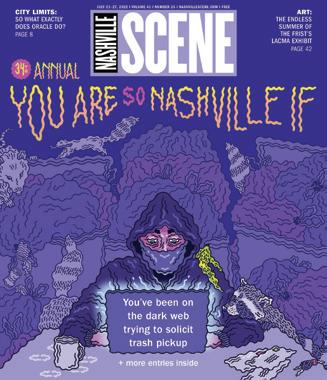

54 Endpoint of the Great Wildebeest Migration
55 Of heavy build
60 Laugh track bit
61 Actress de Armas
62 Channel for a cinephile
63 2/
64 Link letters
ANSWER TO PREVIOUS PUZZLE
Online subscriptions: Today’s puzzle and more than 9,000 past puzzles, nytimes.com/ crosswords ($39.95 a year).

Read about and comment on each puzzle: nytimes.com/wordplay.
Crosswords for young solvers: nytimes.com/ studentcrosswords.
company
2021 at Book 8433, Page 269 in the Office of the Register of Deeds for Williamson County, Tennessee (“Register’s
Office”), and the owner of the debt secured having requested the undersigned to advertise and sell the property described in and conveyed by said Deed of Trust, all of the said indebtedness having become immediately due and payable by default in the payment of a part thereof, at the option of the owner, this is to give notice that the undersigned will, on June 15, 2023, commencing at 10:30
a.m. at the main north door of the Williamson County Judicial Center, 135 4th Ave South, Franklin, Williamson County, Tennessee 37064 proceed to sell at public outcry to the highest and best bidder for cash, by Trustee’s deed pursuant to the terms and conditions announced at such sale, all of Trustee’s right, title and interest in the following described property situated in Williamson County, State of Tennessee (“Real Estate”), to wit:
A tract of land in the 6th Civil District of Williamson County, Tennessee, being Lots No. 1 and 2, of a subdivision of the P.M. Chaffin Farm, and described as follows:
Beginning with a point in the center of Temple Road in line with the stone wall along Temple’s East boundary line, said point being the same point as the point indicating the Northeast corner of a parcel designated for future development, (adjacent to the Mary L Rudolph property), of Temple Hills Country Club Estates of record in Plat Book 11, Page
136, sheet#3 of 5, Register’s Office of Williamson County, TN, running thence with the center of said road South 80 degrees 15 minutes East 350 feet to an iron pin; thence Southwardly 1555 feet to an iron pin; thence North 60 degrees West 256.0 feet to a corner post in Temple’s East line; thence North 4 degrees East 1455 feet to the point of beginning.
Being the same property conveyed to MS Rochester Close, LLC, a Tennessee limited liability company, by Deed from Katherine Harper Morales, unmarried, dated 02/19/2021 and appearing of
record in Book 8433 page 266
Register’s office for Williamson County, Tennessee. WITH A MUNICIPAL ADDRESS OF 6394 TEMPLE ROAD, FRANKLIN, WILLIAMSON COUNTY, TENNESSEE 37069.
The foregoing shall be sold together with any and all other property, real and personal, which constitutes the Property as that term is defined in the Deed of Trust, but specifically excluding any cash, accounts, deposits, escrows, refunds reserves, impounds and other cash or cash equivalents.
Interested Parties
M5 Rochester Close, LLC Benjamin & Darlys, LLC David Chadwick Taylor



The Real Estate will be sold to the highest and best bidder for cash (or for credit against the Obligations if Lender is the highest bidder). All bidders must register at the sale, execute a bidding agreement, and provide the Trustee with a bidder’s deposit of $485,000 by cashier’s or certified check, payable to the Trustee (except for the party secured by the Deed of Trust). The bidding agreement may be obtained in advance of the sale by request to the undersigned. Additional terms may be announced at the sale. The right is hereby reserved to postpone or adjourn this sale, without further publication or notice, by public announcement at the time and place appointed for such sale or for such postponed or adjourned sale. All announcements made at the sale shall take precedence over the terms and conditions of this notice. In said Deed of Trust, Borrower expressly waived the statutory right of redemption, and any and all rights of homestead; dower; all other exemptions and marital rights. Title is believed to be good, but the undersigned will sell and convey only as Trustee.
Title is to be conveyed without any covenant or warranty, express or implied, and any matters having priority over the Deed of Trust and matters which may affect or encumber the Property following
the sale, such as rights of parties in possession; rights of tenants in possession under unrecorded leases or rental agreements; visible and apparent easements; portion of the property within any roadway; any encroachment, encumbrance, violation, variation, or adverse circumstance affecting the title that would be disclosed by an accurate and complete land survey of the land; all leases, grants, exceptions or reservations of coal, lignite, oil, gas and other minerals, together with all rights, privileges and immunities relating thereto, appearing in the Public Records; all matters shown on any applicable recorded plat; taxes or assessments that are not shown as existing liens by the records of any taxing authority that levies taxes or assessments on real property or by the public records; proceedings by a public agency that may result in taxes or assessments, or notices of such proceedings, whether or not shown by the records of such agency or by the public records; taxes assessed by correction pursuant to the provisions of T.C.A. §675-603, et seq.; matters that an accurate survey of the premises might disclose; any facts, rights, interests, or claims that are not shown by the public records but that could be ascertained by an inspection of the Property or that may be asserted by persons in possession of the Property; any encroachment, encumbrance, violation, variation, or adverse circumstance affecting the title that would be disclosed by an accurate and complete land survey of the Property and not shown by the public records; any mineral or mineral rights leased, granted or retained by current or prior owners; prior liens, claims and encumbrances including, without limitation, leases and other agreements; assessments, building lines, easements, covenants, and restrictions that may exist; any lien or right to lien for services, labor or material imposed by law and not shown by the public records; and, statutory rights of redemption of any governmental agency
including, but not limited to, the right of redemption of the Internal Revenue Service pursuant to 26 U.S.C. §7425(d)(1), of the State of Tennessee pursuant to T.C.A. §67-1-1433(c)(1), or of any other taxing authority.
Joseph R. Prochaska, as agent for

Thomas T. Pennington, Trustee Reno & Cavanaugh, PLLC 424 Church Street, Suite 2910 Nashville, TN 37219 Telephone (615) 866-2322
Publication On: May 25, June 1, and June 8, 2023.
Non-Resident Notice
Fourth Circuit Docket No. 14D1063
TALIA ELAINE CROUSE vs. THOMAS JEFFERSON CROUSE
In this cause it appearing to the satisfaction of the Court that the defendant is a nonresident of the State of Tennessee, therefore the ordinary process of law cannot be served upon Talia Elaine Crouse.
It is ordered that said Defendant enter HER appearance herein with thirty (30) days after June 1st 2023, same being the date of the last publication of this notice to be held at the Metropolitan Circuit Court located at 1 Public Square, Room 302, Nashville, Tennessee, and defend or default will be taken on July 3rd 2023. It is therefore ordered that a copy of this Order be published for four (4) weeks succession in the Nashville Scene, a newspaper published in Nashville.
Joseph P. Day, Clerk
Bill Riggs, Deputy Clerk
Date: May 4, 2023
Chelsey A. Stevenson
Robert J. Turner Attorneys for Plaintiff NSC 5/11, 5/18, 5/25, 6/1/23

Non-Resident Notice
Third Circuit Docket No. 23D446
JOSHUA RYAN JAMES vs. Lindsay M. James
In this cause it appearing to the satisfaction of the Court that the defendant is a nonresident of the
State of Tennessee, therefore the ordinary process of law cannot be served upon Lindsay M. James.
It is ordered that said Defendant enter her appearance herein with thirty (30) days after June 8th 2023, same being the date of the last publication of this notice to be held at the Metropolitan Circuit Court located at 1 Public Square, Room 302, Nashville, Tennessee, and defend or default will be taken on July 10th 2023. It is therefore ordered that a copy of this Order be published for four (4) weeks succession in the Nashville Scene, a newspaper published in Nashville.
Joseph P. Day, Clerk
Bill Riggs, Deputy Clerk
Date: May 11, 2023
Frank E. Mondelli Sr. Attorney for Plaintiff NSC 5/18, 5/25, 6/1, 6/8/23
Non-Resident Notice
Third Circuit Docket No. 14D573
Ersel Tim Cooper vs. Connie Sue Cooper
In this cause it appearing to the satisfaction of the Court that the defendant is a nonresident of the State of Tennessee, therefore the ordinary process of law cannot be served upon Ersel Tim Cooper. It is ordered that said Defendant enter him appearance herein with thirty (30) days after June 15th 2023, same being the date of the last publication of this notice to be held at the Metropolitan Circuit Court located at 1 Public Square, Room 302, Nashville, Tennessee, and defend or default will be taken on July 17th 2023. It is therefore ordered that a copy of this Order be published for four (4) weeks succession in the Nashville Scene, a newspaper published in Nashville.
Joseph P. Day, Clerk
Bill Riggs, Deputy Clerk
Date: May 18, 2023
Morgan E. Smith Attorneys for Plaintiff NSC 5/25, 6/1, 6/8, 6/15/23

in as little as ONE DAY! Affordable prices - No payments for 18 months! Lifetime warranty & professional installs. Senior & Military Discounts available. Call 1-866-370-2939 (AAN







